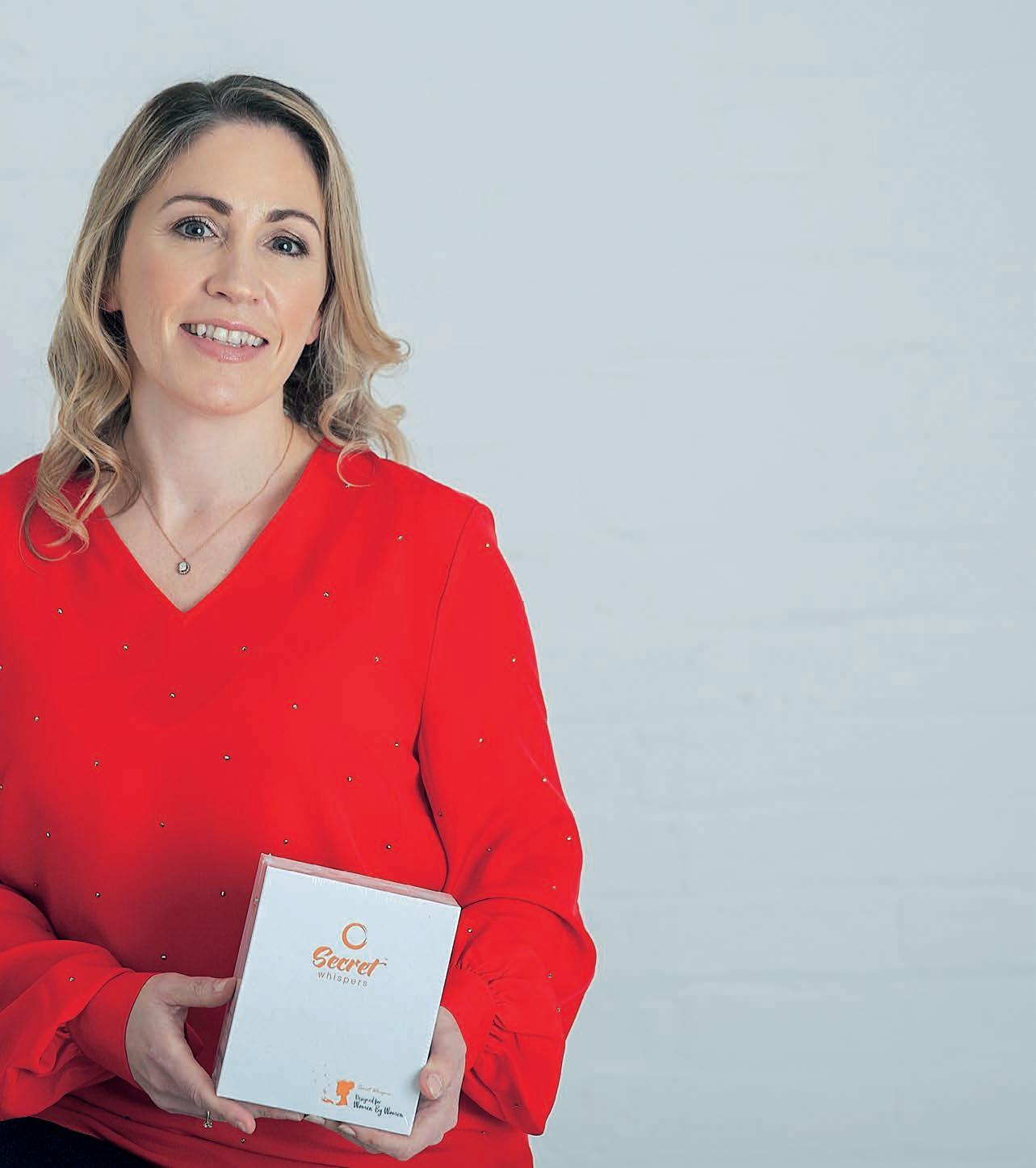Weathering the storm

to tackle the inflation threat RISING COSTS SEASONAL BUSINESSES | DISABLED ENTREPRENEURS JUNE-SEPTEMBER 2022 DRIVING BUSINESS AMBITION FIRSTVOICE.FSB.ORG.UK | JUNE-SEPTEMBER 2022 ELECTRIC VEHICLES Are they a realistic option for small businesses? SEASONAL BUSINESSES The pandemic challenges faced by the tourism sector DISABLED ENTREPRENEURS Supporting an overlooked group
How

first truly joined-up approach to employee health, safety, and wellbeing for SMEs BT201 •Flexible health, safety and wellbeing solutions tailored to your needs •Unique tools to benchmark your organisation •Access to industry leading HR, health, safety and wellbeing tools •Advice and support from industry experts to help you every step of the way. Helps you build a healthy, profitable, and sustainable future for your company. Sign up now: www.beingwelltogether.org support@beingwelltogether.org T.+44 (0)20 8600 1060
The
18 Coping strategies

What can small businesses do to weather the storm of inflation, tax rises and supply chain issues? Penelope Rance reports





22 Critical mass
David Adams looks at the implications for small firms of switching to electric vehicles, and what to consider
26 Big picture
The return of tourism this summer

28
Alex Wright finds out how seasonal businesses have coped during the past two years of the pandemic

32 Deep dive
The challenges faced by disabled small business owners







34
As FSB calls for more support for disabled small business owners, Peter Crush speaks to four such entrepreneurs to find out what would help

june-september 2022 | firstvoice | 3 heads up 6 Need to know Mental health declines among small business owners; call for Government sick pay contribution; time for SMEs to start rent arbitration 9 Data centre Rising costs and labour shortages pose threat 10 Regional voice Round-up of regional news 13 Opinionated Tina McKenzie on supporting entrepreneurship, Nadhim Zahawi on Government upskilling plans, and Dr Calum Carson on job centres advice 38 How to ...Make social media work for you; make better use of your data 42 Legal The new legislation on proactively preventing sexual harrassment in the workplace inside firstvoice.fsb.org.uk
Back in play
Breaking down barriers
features
steps
Networking
to get the most out of networking events
My journey
Colan on tackling the taboo around women’s health
Ask the experts
and
tenant law in Wales member spotlight
shares tips 52 Awards
Awards 2022 54 Member services
debt recovery service gains
million for members
My business
two businesses help people find
calling JUNE-SEPTEMBER 2022 6 38 28
first
44
How
46
Julie
48
The end of lease forfeiture,
changing
49 Member news Theatre school keeps kids engaged during pandemic, and beauty therapist
All the winners from the FSB Celebrating Small Business
FSB
back £1
57
Eloise Skinner’s
their
Publisher: Aaron Nicholls
Editor: Nick Martindale
Email: firstvoice@redactive.co.uk


Lead designer: David Twardawa

Picture researcher: Claire Echavarry
Sub-editor: Kate Bennett
Production: Aysha Miah-Edwards
Email: aysha.miah@redactive.co.uk
Advertising: Lynne Murray


Email: lynne.murray@redactive.co.uk
Tel: 020 7324 2726

 MARTIN McTAGUE, NATIONAL CHAIR
MARTIN McTAGUE, NATIONAL CHAIR
WITH THE LAST TWO SUMMERS MARRED by the impacts of the pandemic, most of us were looking forward to this summer as the start of the economic recovery – sun shining, beer gardens bustling, staycations lifting tourism. But there are also unwelcome clouds as small firms try to rebuild.
In this edition, we look at how the cost-ofliving crisis begins with the cost-of-doing-business crisis, with higher inflation, energy bills and taxes among the factors holding back economic recovery. While we look at ways to manage cost pressures, political decision-makers must also play their part in easing the burden.
Seasonal businesses are hoping this can be the summer in which they bounce back, having been among the hardest hit by Covid-19 restrictions and lockdowns. We look at some of the challenges and innovations from small businesses in leisure and tourism. But times remain tough, illustrated by the fact that we lost 400,000 small businesses last year. As Tina McKenzie argues in her column, policymakers must create an environment in which new start-ups are encouraged and can succeed.
That entrepreneurship should be encouraged across society. As you’ll see in these pages, FSB research shows that there are still barriers for disabled entrepreneurs. I want to see the UK Government set a target of at least 100,000 new businesses run by disabled entrepreneurs by 2025.
FSB’s Celebrating Small Business Awards UK Final in Glasgow was an uplifting reminder of how resilient, dynamic and innovative small businesses are. The winners, featured in this edition, show the importance of small firms in driving economic growth, creating fantastic jobs, products and services, and being at the heart of communities. Follow Martin on Twitter @MMcTagueFSB
First Voice is available on subscription at £42 per annum. For details, contact james.connor@fsb.org.uk


First Voice has an audited net average circulation of 117,852 (July 2020 to June 2021).

AccessAbility help. If you require this document in an alternative format, please ring 01253 336036 or email: AccessAbility@fsb.org.uk

Printed by Warners First Voice is published on behalf of the Federation of Small Businesses (FSB) by Redactive Publishing Ltd (Tel: 020 7880 6200) firstvoice.co.uk | redactive.co.uk 4 | firstvoice | june-september 2022 firstvoice.fsb.org.uk tech bits 58 New kit and apps The best new gadgets and apps for small businesses 60 Digital voice Our pick of First Voice’sonline and social media content out of office 62 I could try... ...Outdoor swimming 64 Downtime Get your team back to nature with a hiking awayday last word 66 Guy Browning How can we keep motivation high when working remotely?
62 This edition of First Voice went to press on 7 June. All information is correct as of that point. inside june-september 2022 first word We hope you enjoy reading this edition of First Voice which you receive as part of your membership with FSB. We'd like to ask you to please consider the environment when you've finished reading it and pass it on to colleagues, friends, family or your business associates to have a read too before recycling it. FSB takes the privacy and protection of your data very seriously, and if you would like to find out more about this, please visit www.fsb.org.uk/privacy. If you would prefer not to receive the magazine at any time, please contact Customer Services on 0808 20 20 888 or by email to customerservices@fsb.org.uk Federation of Small Businesses Registered Office: Sir Frank Whittle Way, Blackpool, Lancashire, FY4 2FE. VAT No. 997 3427 63. The National Federation of Self-Employed and Small Businesses Ltd (FSB) is registered in England, number 1263 540. While every care has been taken in the compilation of this magazine, errors or omissions are not the responsibility of the publishers or of the editorial staff. Opinions expressed are not necessarily those of the publishers or editorial staff All rights reserved. Unless specifically stated, goods or services mentioned are not formally endorsed by FSB, which does not guarantee or endorse or accept any liability for any goods and/or services featured in this publication. ISSN 2399-5467 Copyright: FSB Publications Ltd This copy of First Voice magazine, and the paper envelope it was delivered in, are 100% recyclable FSB publications manager: James Connor Email: james.connor@fsb.org.uk Tel: 07595 284088 fsb.org.uk ARRED most of ery o uild fbusinesscrisiswithhigher R




Aldermore Bank PLC is authorised by the Prudential Regulation Authority and regulated by the Financial Conduct Authority and the Prudential Regulation Authority. (Financial Services Register number:204503). Registered Office: Apex Plaza, Forbury Road, Reading, RG1 1AX. Registered in England. Company No. 947662. Make your money work as hard as you do Visit aldermore.co.uk/businesssavings to open your account today Simple. Secure. Rewarding. Dedicated Business Savings accounts Consistently better rates than the high street banks Get set up online in as little as 15 minutes No fees or charges Operates seamlessly alongside your business current account FSCS protection up to £85,000 “Easy to access, simple to use, fast to deposit and withdraw funds, overall the business savings account is perfect for my needs Business savings customer, Feb 1, 2022
heads up
One in three business owners suffers mental health decline




RESEARCH BY FSB HAS unveiled the devastating impact of Covid-19, lockdowns and worsening late payment culture on the mental health of small business owners.


The survey of 1,000 business owners finds that a third (34 per cent) of all small business owners state
their mental health declined over the course of the pandemic, while one in four (24 per cent) report that they currently have a mental health condition such as anxiety, depression or post-traumatic stress disorder.
The study also lays bare the ongoing impact of the UK’s poor payment culture on mental wellbeing. Six in 10 (62 per cent) small business owners say they were subject to late or non-payment after Covid-19 hit, with a quarter (26 per cent) stating that this impacted their mental wellbeing.
FSB is encouraging the Government to improve Access To Work take-up by ensuring that health professionals point patients towards the scheme when writing fit notes, and to launch an alternative to the New Enterprise Allowance to help those with mental health conditions who are out of work create start-ups.
“By building on, and promoting access to, the support that’s already available to business owners and their teams, the Government can make a real difference in protecting mental wellbeing,” said Tina McKenzie, FSB Policy & Advocacy Chair.
1New health and safety laws
on PPE
Businesses need to know about changes to the law on use of personal protective equipment (PPE) at work, which came into force in April. PPE must be provided, free of charge, to all workers, including casual staff, contractors and anyone who carries out casual or irregular work for one or more organisations. It does not apply to the self-employed, who are responsible for their own arrangements.
“Most organisations will likely have already been providing PPE based on the nature of the role itself rather than the status of the person doing it,” said Mark Hamilton, a partner at law firm Dentons. “Perhaps in the case of employers who largely rely on workers, for example, food delivery companies, it will be a significant logistical and financial commitment. Previously they would just have made it a condition of work that one was worn, with the worker having to supply their own.”
Employers will also be responsible for storing and replacing lost or defective PPE, which may include items such as jackets, goggles, gloves, masks, hard hats and ear defenders. They must also provide full training in how to use any kit.
Other PPE laws also apply to employers with specific risks, such as for those working on roads or with radiation, lead exposure, asbestos, noise or substances hazardous to health.
The Health & Safety Executive say employers must carry out risk assessments; if these indicate that PPE should be worn, employers should carry out a PPE suitability assessment. Inspectors can enter any business premises at any time, with actions ranging from verbal or written advice to statutory enforcement notices or prosecution.

2 firstvoice.fsb.org.uk 6 | firstvoice | june-september 2022 9 THINGS YOU NEED TO KNOW
MENTAL HEALTH
REGULATION
SICKNESS TRANSPORT
3 heads up need to know
Boost for EV infrastructure
SB IS URGING THE Government to adopt a proposal it has developed jointly with the TUC, which would see small firms able to access a rebate scheme to cover the cost of sickness absence.
“With operating costs surging in the round, small firms need more financial
F
assistance to go on doing right by their staff when they’re unwell.
“Allowing small community businesses to recover sick pay costs will give them that much more space to invest, recruit and retain staff, spurring our economic recovery from the grass roots up.”
The Government plans to increase the number of public electric vehicle (EV) charging points to 300,000 by 2030, raising public charging capacity by almost 10 times.
Call for support for firms on energy costs
FSB has called on the Government to do more to help small firms cope with the rising price of energy.
“Energy security has rightly moved up the Government’s agenda in recent months,” said FSB National Chair Martin McTague. “On the ground, we have a situation where small firms are caught between the consumer price cap and the leverage that big corporates can yield when negotiating contracts.
“More direct financial support is what will make the difference to our members – reducing the risk that further hikes in utility bills feed through to even higher
“The average cost of sickness absence, including finding cover, stands at more than £3,000 a year for small employers, equating to £5 billion across the small business community as a whole,” said Tina McKenzie, FSB Policy and Advocacy Chair.New Office for National Statistics figures show 149.3 million working days were lost because of sickness or injury in the UK last year, with Covid-19 accounting for nearly one in four of all absences.

The £1.6 billion project, which forms part of the EV Infrastructure Strategy, is part of plans to make charging EVs cheaper and easier than refuelling a petrol or diesel car. Access to charging points is one of the most commonly cited barriers to EV uptake, along with the purchase cost and range of vehicles.
consumer prices – alongside a Help To Green initiative to incentivise on-site energy generation."
5 6 UTILITIES
He also called on the Government to do more to turn levelling up talk into tangible action: “As the Government pushes the levelling up agenda over this parliament, it needs to ask itself the questions that matter: Are we genuinely improving high streets? Do community businesses feel empowered to invest and expand? Are we creating enough start-ups to counter the thousands lost over lockdowns?” Reducing regulation and reforming rates should also be a priority, he added.
FSB will be inviting expressions of interest from its members to join its board of directors next year. This is an exciting opportunity for members to play a role in FSB’s work to support small businesses, by leading and influencing our overall strategy and the promotion of FSB’s long-term success. There are also similar national volunteer opportunities that may appeal to members with an interest in risk management and collaborative scrutiny of processes. FSB is keen to hear from members from minority and under-represented groups. Further details will be available in the summer. Email FSBGovernance@ fsb.org.uk for more information.
4 june-september 2022 | firstvoice | 7
FSB BOARD
Push for sick pay rebate scheme
Call for board directors
heads up need to know
7
SMEs urged to start rent arbitration process
FSB IS ENCOURAGING BOTH small businesses and landlords to begin the process to deal with outstanding rent arrears built up during the Covid-19 lockdowns, ahead of the Autumn cut-off date.

The business group fears putting off the process – or allowing landlords to ‘run down the clock’ –could mean small businesses miss out on arbitration to settle the debt, and instead are taken to court to pay the full debt once the six-month window to apply for arbitration ends in September.
FSB is also advising small firms that have been issued with a notice to pay by their landlord to check whether arbitration is an option.
FSB National Chair Martin McTague said: “Small business tenants were subject to a huge amount of disruption during the pandemic, as firms were forced to close and couldn’t pay their rent.
POLITICS
But that debt does need to be dealt with. We hope landlords will enter into positive and pragmatic negotiations with tenants about rent arrears to make sure businesses and jobs are protected.”
During the pandemic, certain businesses were given Government protection in the form of a ban on forfeiture of commercial premises for rent arrears, as well as restrictions on bailiffs’ ability to seize tenants’ goods, both of which have now ended.
The Commercial Rent (Coronavirus) Act came into force in March, and ringfences outstanding unpaid rent. Landlords and tenants are now encouraged to come to an agreement over repayment; if that is unsuccessful, the arbitration process can begin – you can read more about this on page 48.
HIGH STREETS
FSB Scotland: High streets need cash
The Convention of Scottish Local Authorities and the Scottish Government have published a new plan to revitalise Scottish town centres. Following the publication, FSB in Scotland has urged local and national government to pledge long-term support for local economies.

Andrew McRae, FSB’s Scotland policy chair, said: “Scotland’s town centres and high streets have long been associated with independent and local businesses. To ensure these important local places have a bright future, they need to see public sector and big business investment.
“The test of this plan will be whether it brings people and money to our centres. We need to see public sector services and facilities in the heart of communities, and big businesses investing in high streets. “National and local decision-makers must work with local businesses closely as they develop these proposals.”
Northern Ireland TV election debate
Ahead of the high-stakes Northern Ireland Assembly Election, FSB hosted and produced a head-to-head studio debate involving the largest parties for the first time. Against a backdrop of political instability, the economy spokespeople of the executive parties were cross-examined by journalist and broadcaster Karen Patterson. Mike Nesbitt (UUP), Stewart Dickson (Alliance), Caoimhe Archibald (Sinn Féin), Gordon Lyons (DUP) and Matthew O’Toole
(SDLP) were grilled on multiple issues including the scale of the financial challenges facing SMEs, the devolution of tax powers and the need for a childcare strategy. Partnering FSB in the hustings were Women in Business and Ulster University Business School.
FSB members were also given the chance to put their questions to the panel of politicians. The debate was recorded at a state-of-the-art TV studio in Belfast and
uploaded to YouTube’s First Voice channel.
In advance of the hustings, FSB published its own manifesto – Unfinished Business – a distillation of the key issues that business owners right across Northern Ireland flagged up as being in need of action. The delivery of better government is central to the call to prioritise people, finance and sustainability.
8
DEBT firstvoice.fsb.org.uk 8 | firstvoice | june-september 2022
9
heads up in-depth
data centre
Rising costs and labour shortages start to bite
FSB’s Small Business Index finds that 87 per cent of businesses are saying operating costs are up from a year ago.
Six in 10 pointed to higher fuel costs, with 58 per cent highlighting utility bills and 27 per cent taxation. Rising input prices were highlighted by 48 per cent, and 40 per cent reported higher labour costs.
Labour shortages are having an impact, with 55 per cent of small business owners saying they are operating below capacity, while the number of firms stating they
currently export (23 per cent) is four percentage points down on last year.
The Index returned to a positive reading of 15.3, but it remains 12 points below the same period a year before.
Firms in accommodation and food (+16.5) are bullish, as are those in information and communication (+32.1).
Manufacturing (-9.1) and wholesale and retail (-8.2) report negative readings as operating costs, supply chain disruption, labour shortages and belt-tightening hit.
1 in 3
The proportion of UK customers who say they would be more likely to shop at a small or local business that had a funny or witty name, a study by insurance firm Simply Business claims
21%
The proportion of business owners who suffered from poor mental health over the past two years but did not take any time off, Xero and the Centre for Economics & Business Research finds
27%
The amount of small business owners who see cyber-security as the biggest threat to their firm, up from 8 per cent in 2021, research by card payments firm takepayments suggests
june-september 2022 | firstvoice | 9 firstvoice.fsb.org.uk
CONFIDENCE
SMALL
SMALL BUSINESS INDEX SNAPSHOT Most confident Least confident SMALL BUSINESS CONFIDENCE BY REGION +32 +20 -8 -9 -10 -5 0 5 10 15 20 25 30 35 QUICK FIRE STATS Q2 2021Q3 2021Q4 2021Q1 2022 +16.4 -8.5 +15.3 50 25 0 -25 -50 +18.6 0 3 Information and communication Accommodation and food service activities Retail Manufacturing Construction +14 -1 +9 +1 +3 +11 +17 +12 +14 +43 +17
BUSINESS CONFIDENCE BY SECTOR
regional voice
WALES
FSB North Wales Small Business Conference 2022
FSB will host a free bootcamp and networking event at the Hilton Garden Inn, Snowdonia on 14 July.
Led by broadcaster Sian Lloyd, this conference, against the stunning backdrop of Adventure Parc Snowdonia, puts the focus on North Wales small businesses and the tools they need to survive and thrive during these difficult times.

Three sessions will examine the support your business can access from organisations such as FSB, Business Wales, local colleges and the Development Bank of Wales.
Hear also from Money and Pensions Service financial
SCOTLAND North Coast 500
FSB members can take advantage of the immense popularity of the North Coast 500, described by Jeremy Clarkson as “the best road trip in the world”, and promote themselves to a global audience.
If your business in any way benefits from Highland tourism, and especially Northern Highland tourism, you can reach many of the vast numbers of visitors heading north each year – or who are considering doing so – by joining North Coast 500 Ltd.
North Coast 500 Ltd exists to support local economies and communities within the Northern Highlands and, with this in mind, it established and manages the North Coast 500 brand and promotes the 516-mile circular route through the area’s stunning coastal scenery.

To find out about the benefits of dual FSB/ NC500 membership, visit www.northcoast 500.com and click ‘For Business’
SOUTH EAST
experts about how you can protect the hard work you have put into your business through sound financial planning. The keynote speaker is Sid Madge of meee.global, who will be sharing his insights into how professional branding and marketing can help your small business fly.
This event is free to attend and refreshments, including a buffet lunch, will be served. Parking is free and there is full disabled access at the venue. The event starts at 9.30am and finishes at 3.30pm.
To register, please visit www.fsb.org.uk/eventcalendar/fsb-nwsbc22.html
Kent business summit outlines future plans
More than 250 of Kent’s businesses, including many SMEs and FSB members, recently gathered for the annual Kent Business Summit at the University of Kent.
Proceedings were chaired by FSB member Deborah Turner. While she explained that growth is forecasted to slow, Andy Martin from the London Resort explained it was aiming to bring billions of private investment into Kent.
Other speakers included Roger Gough, the leader of Kent County Council; Richard Hicks, the Deputy Chief Executive of Medway Council; and plenty of speakers in breakout rooms during the second session of the day.
10 firstvoice.fsb.org.uk 10 | firstvoice | june-september 2022 heads
area update
up
ROUND-UP OF REGIONAL NEWS
York fund to boost SME eco-credentials
First York has launched the York Go-Greener Fund, with £20,000 available to help small businesses in retail, leisure, hospitality, health and beauty, and other consumer services encourage eco-friendly high street spending and boost customer-led sustainable growth.

The purpose of the fund is to support plans by independent owners and small firms in consumer sectors to build on environmental practices and products that directly appeal to customers, helping them to consider sustainable choices in what they buy and the services they use. It has the support of FSB in North Yorkshire and the York & North Yorkshire Growth Hub.
The York Go-Greener Fund will make awards of £2,000 to 10 successful applicants. Videos showcasing these businesses will then go to a people’s vote, with the winner getting the chance to be featured in a film about the region’s sustainable achievements. This is being made by the York & North Yorkshire Growth Hub and includes some of the world’s leading voices on climate change.
Businesses shine at Northern Ireland FSB Awards
FSB Northern Ireland celebrated the achievements of small businesses at its first large-scale face-to-face event since the beginning of the pandemic. More than 160 people attended the lunch award event at the Crowne Plaza, Belfast, which was hosted by broadcaster Wendy Austin.
Brendan Kearney, FSB Northern Ireland Regional Chair, said: “The calibre of award entrants this year was just outstanding. The judges had an incredibly difficult job trying to select just one winner in each category and this highlights the innovation, ambition and creativity of small businesses here.” Read about the UK final on pages 52–53.
WEST MIDLANDS
Meet the Buyer event in West Bromwich
A Meet the Buyer event takes place at the Hawthorns on 14 July between 10am–3pm. This is a great opportunity for businesspeople in the borough to talk about what they do with buyers who spend billions of pounds every year in the Midlands on goods, services and works. There will also be workshops, training and presentations until 3pm. It is free to attend, but attendees need to book. For more information, visit bit.ly/3wcm7rZ
FSB to launch English Local Government Awards
FSB is launching the first England regional-wide Local Government Awards, due to be held virtually on Friday 14 October 2022.
FSB has been hosting local authority awards for more than 10 years, and this history has consistently demonstrated the importance of celebrating positive local council contributions and engagement with FSB, members and small businesses.
The FSB English Local Government Awards will:
Share best practice from local authorities across the English regions
Showcase the importance of local authority engagement with, and support of, small businesses Celebrate the positive impact that local authorities can have on small businesses and their outcomes.
Karen Durcan, FSB’s Head of English Regions, said: “At a time when small firms across England are faced with an increase in the cost of doing business, it is vitally important that councils look to support their local economies and that we can celebrate where achievement is high and best practice can be shared.”
We would love to hear about your experiences with local authorities: where a project or person has gone above and beyond to support and how their work has made a positive impact on your business.
Please email Lucy SeymourSmith, Regional Policy Manager (England), at lucy.seymour-smith@fsb.org.uk
heads
ENGLAND
up area update
YORKSHIRE
NORTHERN IRELAND
june-september 2022 | firstvoice | 11 firstvoice.fsb.org.uk
Dusty stock or twiddling thumbs... won’t pay the bills or grow your business! Find new customers and sell your excess or slow-moving stock, or spare capacity and down-time at baggl.com! It’s FREE to join, FREE to list and if you don’t sell, there’s nothing to pay! We’ll even add £150 to your baggl account to get you started!*
AS THE HEAD OF A PROMINENT recruitment company, placing people in their dream jobs is a life-long passion that drives my work.
My career began at the age of 12, washing dishes in our family café. By 14, I was vacuuming the snooker hall and allocating the balls. By 16, the café had turned into a taxi depot and I worked on the phones, giving directions to men four times my age.




There is no doubt that the skills I use every day in business – commitment, resilience, loyalty, communication and hard work – came from those experiences. Nothing prepares you for work more than a small, local and family-run business.
My first job after graduating was working with ex-offenders in Belfast. Every day, I encountered the lives of jobseekers who were endeavouring to move forward via meaningful employment. During this time I turned to the small business community for support in assisting those jobseekers’ journeys. These small business owners honed my sense of community, my empathy and the importance of human relationships in making business work.
I was fortunate to build a successful career in recruitment for 15 years, during which time I learned about all types of



Power of passion
businesses and regulatory environments. I saw first-hand how some countries support SMEs, while others are not so well equipped. Business is the art of what is possible, and governments must provide fertile foundations and support so that all kinds of businesses can thrive, rather than find themselves held back by bureaucracy and heavy taxation.
In 2013 I returned to Belfast and started a recruitment company. I remember the first couple of days in my tiny office, with no staff, no customers, no phones and no computers. It’s hard to imagine that that was 10 years ago, when we now have
The biggest challenge recently has been Covid-19, which saw the number of self-employed and small firms in the UK drop by 400,000 last year. This shows why it is vital for decision-makers to deliver pro-enterprise policies that not only support small businesses and allow them to grow, but also encourage new start-ups.
One pandemic positive, particularly for those working from home, has been the greater ability to take a first step into entrepreneurship without making the sudden leap from employment into self-employment. We have seen 800,000 ‘side-hustle’ businesses established, and with the right support from policymakers, many could become full-time businesses, replenishing our community.
Starting a business can be a stressful and lonely journey. FSB strives to give new starters, existing small business owners and the self-employed the support required to make their venture successful.
Throughout my career, I have met those who have said no to new ideas and closed doors to new business opportunities. This has only enhanced my passion for helping people into work, and shaped me into the entrepreneur I am today.
offices all over Ireland! There is no doubt that a hunger for success and solutions helped, and continues to help, businesses around me with the biggest challenge –finding the right people at the right time.
Our call to government is to ensure it fulfils its role in looking out for businesses. I am looking forward to being that voice for all the entrepreneurs running SMEs.
I believe our focus for a new culture of enterprise should be helping people turn what they love into a viable, thriving and sustainable business. The impetus is on the Government to foster a business-friendly environment for entrepreneurs, enabling the small business community to thrive.
june-september 2022 | firstvoice | 13 firstvoice.fsb.org.uk heads up small business support
Running a small business is not an easy option but, with the right support in place, we now have an opportunity to create a whole new generation of entrepreneurs
Our call to government is to ensure it fulfils its role in looking out for businesses
S THE HEAD A R op w w bus b env e some som others oth Busines Bussiin and gove a annd go foundati founnd d of busine buus s
TINA MCKENZIE is National Chair, Policy and Advocacy, FSB.
TINA MCKENZIE
heads up skills development
APOLEON ONCE CALLED
NBritain a nation of shopkeepers. I don’t think he intended it as a compliment, but it is one – and not just of shopkeepers, but also artisans and craftspeople, niche producers and bespoke suppliers. These small, vibrant entrepreneurs are the lifeblood of our economy and will help it get back on its feet after the Covid-19 pandemic.
SMEs are vital to a dynamic economy. They play a key role in building the high-skill, high-wage economy we need. What’s more, they are more likely to hire young people than larger employers, so it stands to reason that we need to make sure they are in touch with the latest developments in technical education.
highlighting the huge range of training and employment schemes now available for businesses, from apprenticeships to traineeships, T Levels to Higher Technical Qualifications. They are all designed to unlock talent and realise potential.
The opportunities available have been designed by employers of all sizes, and reflect the needs of actual businesses. There’s a vast range of flexible and supported programmes for SMEs to take advantage of, and some include funding and payments for employers.
Right now, SMEs receive 95 per cent of apprenticeship training costs, and apprenticeships can be funded by a levy-paying employer. For employers that host T Level industry placements or trainees, a £1,000 payment is available.
host T Level or T trainees, a £1,000 payment is available. traine
A national survey has found that employees, by and large, are keen to improve their skills. In fact, more than a quarter said that progression and opportunities to learn were among their top goals at work. I find statistics like this cheering. It means all the work we are doing to invest in the skills economy stands a greater chance of success because we are pushing an open door.
The Skills Act will give us the structure we need for a flourishing skills economy. It is going to make sure that everyone, at every life stage, can retrain or upskill. This is not just good on an individual level – it’s an economic imperative for employers, large and small.
at n to than nd ng their rk we onomy s door ructure onomy one, at kill. ual e for make ryone. rms, is led,



By enabling people to meet the challenges of a rapidly changing labour market, we will not only make the country more prosperous and competitive, but also fairer for everyone. The legislation, like our other reforms, is about levelling up in action. A skilled, motivated workforce is the key to driving better performance and boosting productivity, and there has never been a better time to make skills a top priority.
Our ‘Join the Skills Revolution’ campaign is helping businesses across a wide range of sectors to gear up for economic recovery. It shows employers the benefits of technical education,
The ‘grow your own’ approach to skills has benefits for small firms that go beyond the obvious. Having an apprentice or T Level student working for an employer early on in their career means skills can be shaped to fit business needs. Employers recognise when they are on to a good thing. We are seeing those with ambitious recruitment strategies opening up opportunities for people of all ages and abilities to develop the skills their businesses need.
skills can Emplo to a ambitiou up oppor and abili business
Birmingham-based Lander Automotive is a great example. It won SME of the Year in the National Apprenticeship Awards by growing its own talent as part of a response to an ageing workforce. After a large-scale recruitment drive, it now has 60 manufacturing apprentices ve higher level apprentices on site, and half of its workforce is under 30. ere has never been a better time for employers to think about how skills can improve long-term prospects, and the future for small and medium-sized companies has never looked brighter.
NADHIM ZAHAWI MP is Secretary of State for Education. Views expressed are those of the author and not necessarily those of FSB.



Birmin is a great Year in th Awards b of a resp After a la now has and five h There h employ imp futu com NADH State f are necessar

Shaping the future
firstvoice.fsb.org.uk 14 | firstvoice | june-september 2022
Small businesses can take advantage of training and employment schemes to help develop the talent they need
It is no secret that a skilled and motivated workforce is the key to driving better performance
Illustrations: Sam Kerr
NADHIM ZAHAWI















WE'REESSENTIAL PROTECTIONFORTHOSE RAINYBUSINESSDAYS. INSURANCEBROKING, CREATEDBYFSB. FORFSBMEMBERS. WWW.FSB-INSURANCE-SERVICE.COM CALL02039628009ANYWEEKDAY9AMTO5:30PM Quality.Advice.Value.That'swhatwegiveto everysinglebusinesswhocomestousforhelp findingtherightinsurance. Frompublicliabilitytocybercoverwe'vefound insuranceforeveryonefromarchitectstozoo keepers.SupportingFSBmemberslikeyou whentimescanbeattheirmostchallenging. RegistrationwithFSBInsuranceServiceisfree, andwitha99%customersatisfactionrating,you canbesecureintheknowledgeyou'vechosen therightbrokerforyourbusinessinsurance. FSBInsuranceServiceLimitedisauthorisedandregulatedbytheFinancialConductAuthority(FCARegistrationNo:788654)RegisteredOffice:20FenchurchStreet,London,UnitedKingdom,EC3M3AZ.CompanyNumber:10831430
heads up employer/job centre relationship
 DR CALUM CARSON
DR CALUM CARSON


Two-way street
small
centres are not proving a credible and engaging partner, what changes need to be made? Can a better relationship be found, and what would this look like?
THE RELATIONSHIP BETWEEN small or local businesses and the job centres that serve the areas in which they operate has long been complicated, as employers’ priorities and requirements have evolved in an ever-changing labour market alongside changing policy directions.
This relationship has grown more complex as digitalisation of employment support has drawn businesses towards private sector recruitment services. The establishment of Universal Credit (UC) as a means of support for both in-work and out-of-work individuals and households has added a further layer of complexity.


The UC system’s rationale – in which individual jobseekers are expected to continuously search for new employment opportunities and evidence this – also has consequences for employers, particularly in terms of the way they view and interact with job centres. Many complain about the extra resources consumed when faced with an enormous pile of applicants who are simply not right (or qualified) for a role but have put themselves forward in order to satisfy UC requirements.
This raises a number of questions: do such situations inspire employers to look away from public employment services and towards commercial operators? If job
ese are the sorts of questions being explored as part of a project on employer experiences of UC and related employment support across Greater Manchester and West Yorkshire. Previous research has generally focused on the perspectives and experiences of individual jobseekers, with the role of employers in this system largely ignored. Such invisibility has also been reflected in a lack of employer engagement by

differences of the sectors they are operating within, alongside a corresponding rise in the suitability of the potential candidates put forward for consideration to employers by job centres.
Such discussions have also led to new questions over the role businesses have in helping to support unemployed people back into work. Many organisations are keen to emphasise that the employer-job centre relationship is a ‘two-way street’, and are keen to meet them halfway in building a more effective system.
There have been encouraging signs that policymakers have taken notice of how these relationships could improve public employment services across the UK. With the announcement of the new ‘Way to Work’ programme, job centres will place emphasis on working with employers to better understand their recruitment needs. While it remains to be seen how effective this will be, it seems clear from this policy move and employers’ enthusiasm for change that there is a renewed appetite for a paradigm shift in the current relationship between employers and job centres.
policymakers in the design and launch of recent job creation programmes such as Kickstart, which need to work for and with employer practices in mind.
In interviews for this project, employers have put forward a number of suggestions for job centres. These include a greater emphasis on understanding the needs of small businesses, and the intricacies and
DR CALUM CARSON is a postdoctoral researcher at the Decent Work and Productivity Research Centre at Manchester Metropolitan University. To find out more about the project, email C.Carson@mmu.ac.uk. The support of the Economic and Social Research Council is gratefully acknowledged. Views expressed are those of the author and not necessarily those of FSB.
firstvoice.fsb.org.uk 16 | firstvoice | june-september 2022
Improved links between
firms and job centres are overdue. With policy shifts and an understanding of employer perspectives, change may be on the way
Job centres will be placing a new emphasis on working with employers to understand their recruitment needs
centre c ce e ennttr r re en engag ga be ma ma found fouun n nd d The e explo e exxplo exper
The switch to digital is coming and could put your security at risk. Upgrade your business security with a future-proof ADT system before it’s too late.




Protect your business at














Excellent
A disconnected alarm is as useful as a chair without legs.
COPING STRATEGIES

FOR MANY SMALL FIRMS, the cost of doing business in the UK is nearing crisis point. The combined weight of tax increases, high inflation, energy price hikes, supply and delivery costs, and late payments are putting their ability to keep trading in the balance.
“Goods and services cost significantly more than five years ago,” says Paolo Massimilla, UK MD of consultancy firm Expense Reduction Analysts. “UK inflation is currently nine per cent, with no signs of reversing. Bluntly, it can be hard for large, established companies to do business against this backdrop. It’s harder still for smaller ones.”
FSB’s latest Small Business Index shows cost pressures at a seven-year high, with 87 per cent of respondents saying outgoings have increased. “Inputs, fuel and utilities are the most cited
contributors – and producer price inflation is now topping 19 per cent,” reports FSB national chair Martin McTague.

In response, FSB wants action on employment costs and business rates, expansion of the statutory sick pay rebate for small firms, support with energy costs, a crackdown on the poor payment culture, and simplification of R&D tax credits.
“FSB is working to secure a range of support from government for members,” says Mr McTague. “We’ve successfully campaigned for an increase in the Employment Allowance to £5,000. Across the small business community, that amounts to £2.8 billion of support, enabling a firm to employ four full-time staff on the national living wage without paying a penny in employer NICs.”
While the smallest enterprises may be most up against it when it comes to tackling rising business costs, there are practical ways to mitigate unplanned



increases, and control expenditure. From office and staffing, to packaging and purchasing, micro and small companies can surface efficiencies in every aspect of the business, and seek support from member organisations, the Government, and local communities. Taken together, the following ways could help you through one of the trickiest periods in living memory:
1BETTER FINANCIAL MANAGEMENT

“Businesses need to understand their financials,” says Rhodri Taylor, partner at Zeal Tax Consultants. “What are the profit margins? What are you spending each month on supplies, services and wages? What are average debtor and creditor days? Identifying ways to improve these figures will have

firstvoice.fsb.org.uk
18 | firstvoice | june-september 2022 Photography: Getty
Rampant inflation coming on the back of higher taxes and supply chain disruption mean there’s rarely been a trickier time to run a business. But some good old-fashioned housekeeping can help cut costs and free up resources, says Penelope Rance
feature rising
costs
Businesses need to understand their financials. What are you spending each month?

june-september 2022 | firstvoice | 19 firstvoice.fsb.org.uk feature rising costs
a major impact on the ability to cope with rising costs.”
Cost-optimisation exercises not only limit waste, but can also unearth opportunity, adds Mr Massimilla. “They might reveal an opportunity to sell your waste, turning a cost into a profit, or the chance to reduce materials prices by sourcing from alternative suppliers.”
Allow technology to take the strain, says Michael Office, VP, product, UK and Ireland, at Sage. “Adopting a digital system can reduce the stress around managing money flowing in and out of the business.”
2 STREAMLINE STAFFING
The increase in the national minimum wage and rising living costs are forcing salaries higher, compounding staffing costs. But streamlining doesn’t have to mean letting people go, just improving productivity.
“For example, if your company sends a lot of customer mailing, switching to email saves money on stationery, and frees up time for the administrator who stuffs the envelopes,” points out Mr Massimilla. “Their time is a valuable commodity that can be spent elsewhere, perhaps filling a vacancy that would have cost your company thousands.”

Consider whether new positions could be part-time rather than fulltime, and remember that retaining talent is more cost-efficient than hiring. “Look after your staff – make sure they don’t have reasons to leave,” says Steve Case, CEO of Finance Box. “Offer them incentives aligned to the company targets, so that they win if you win.” According to research by McKinsey, 40 per cent of employees are looking to leave their jobs in the next three-to-six months, so holding on to valued staff will help keep recruitment costs down.
3
LOWER OPERATING EXPENSES
With more companies set up to enable home or hybrid working, there is an option to reduce office costs. “They could sell off space, tear up costly rental contracts and make savings on utility usage,” suggests Mr Massimilla.
Technology can also help to combat cost increases. “This could include digitalising operations, using technology to reduce friction and run the business with greater flexibility,” says Mr Office.
“During the pandemic, businesses that were more agile came out stronger, and this agility was largely powered by tech. Now the government is providing incentives to invest in digital technology to boost productivity through the Help to Grow: Digital scheme.” FSB is lobbying for the Help to Grow scheme to be expanded to make it accessible to more small businesses.
4 SMARTER ENERGY USE
Research by Smart Energy
GB shows that 61 per cent of microbusiness owners are worried about their energy bills. Prices won’t drop any time soon, but using energy more efficiently will help. Install a smart meter to track electricity use, ensuring you don’t overpay. “By knowing how much energy your business is using, you can accurately budget for energy spend and reduce the shock of unexpected bills,” says Fflur Lawton, Head of Public Affairs at Smart Energy GB.
Simple actions such as switching off unused appliances, changing to LED lightbulbs, installing motion sensors for lights, and insulating against drafts all engender efficiencies. “Staff engagement is important, as everyone has a role to play in becoming more energy efficient. Get them involved and they’ll take it seriously,” adds Ms Lawton. “Our research also found 40 per cent of consumers would be more likely to visit businesses that care about being sustainable, so publicising energy efficiencies can win customers.”
5 REDUCE, REUSE, RECYCLE
The ‘three Rs’ mantra can be applied to packaging, materials, energy and production processes, cutting down on the new inputs you need to buy.
firstvoice.fsb.org.uk 20 | firstvoice | june-september 2022
Ensuring your packaging is at least 50 per cent recycled will protect you from increased costs
feature
rising costs
This may also save you money as regulations change. Following the introduction of the plastic packaging tax, for example, previously cheap packaging comes at a higher cost.
“All plastic packaging must be made from 30 per cent recycled material or be subject to a tax of £200 per tonne,” states Mr Massimilla. “Ensuring your packaging is at least 50 per cent recycled and, if possible, fully recyclable will protect you from increased costs.”
6
HONE YOUR NEGOTIATION SKILLS
Some smaller or independent suppliers may let you barter to reduce list prices. If you think they might do a deal, ask. “If you don’t ask, you don’t get. Starting with the premise that you’re not going to pay sticker price, ask what the supplier can do for you, and what you can do for them in return,” advises Darren Smith, founder of Making Business Matter.
They may say no, but someone else will probably say yes. “Depending on the cost category, there will be plenty of alternative suppliers lining up to take your business, even if it does mean reduced profits for them,” adds Mr Massimilla.
7
TACKLE TAX HEAD-ON
Tax is a major, unavoidable outgoing, so not overpaying is crucial. “Ensure your business and investments are structured in a taxefficient manner and that you are taking advantage of all the available tax incentives and reliefs,” says Mr Taylor. “We encourage clients to make sure they set tax cash aside so that they are never in default,” adds Mr Case. “However, that often leaves a cash surplus being used inefficiently. Therefore, work out where your risk level is and use any available cash sensibly.”
Business owners should also be aware of the tax breaks available for investors, says Mr Taylor.
Tax efficient investments like the Enterprise Investment Scheme, the Seed Enterprise Investment Scheme and Venture Capital Trusts can offer significant tax relief, making investing in small businesses more attractive. SME owners are rarely tax experts, so find someone who is. “In my experience, good advice pays for itself,” adds Mr Taylor. Having your accounts, payroll or tax handled by a professional should give you access to all available breaks and benefits.
8
MAKE THE MOST OF FSB MEMBERSHIP
FSB members can access exclusive services to increase business efficiencies and save on external providers. Your membership adviser can outline relevant services, including free business banking with Co-operative Bank. The FSB Legal Hub provides on-demand support, guides, factsheets and 1,300 compliant document templates, which can avoid the need for expensive legal advice.
Exclusive discounts and a dedicated advice line are available through FSB Insurance Service, while the Funding Platform offers access to finance at lower costs. FSB’s Debt Recovery service helps members recoup monies owed, with 24/7 support. Find the full range of member services at fsb.org.uk/join-us/ membership/fsb-member-benefits.

9 TAKE UP EXTERNAL SUPPORT
The Government offers hundreds of support schemes, accessible via the business support portal at gov.uk/ business-finance-support, where you can filter by type of help, business size and sector to find relevant initiatives. These include sustainable energy adoption, access to finance, growth initiatives, training, manufacturing support and help to compete for contracts.
Ask
“It’s also crucial to speak to as many people as you can at the local level to see what support is out there – speak to us, speak to your peers, speak to your local authority, speak to your local enterprise partnership,” adds FSB’s Mr McTague. “Through having those conversations you’ll find the initiatives that can help you the most, while building a network that will contribute to your success long-term.”
what the supplier can do for you, and what you can do for them in return
feature rising costs june-september 2022 | firstvoice | 21 firstvoice.fsb.org.uk
PENELOPE RANCE is a freelance business journalist
feature


electric vehicles
CRITICAL MASS



e to to drive a towards electric vehicles, cost means
e need to reduce carbon emissions is helping to drive a push towards electric vehicles, and the cost of fuel means this could be a compelling option for small business owners.
UST A FEW YEARS AGO, many people still viewed electric vehicles (EVs) as a strange, expensive novelty. Today there are many reasons why small businesses should consider buying or leasing them, including the fact that sales of new petrol and diesel cars and vans are set to be phased out in the UK from 2030. While there are still relatively few EVs on the road today –about 460,000, according to the RAC – you probably know someone who drives one.
“A lot of businesses are interested but there are still many questions and concerns, around charging and the purchase cost in particular,” says FSB policy advisor Friederike Andres. FSB research suggests that only 9 per cent of small businesses expect to switch some or all their vehicles to EVs by 2030. Almost half ( 46 per cent) said the purchase cost was a barrier to adoption – understandably, given current economic conditions.
Grants to help buy the vehicles and install chargepoints are available from the Office for Zero Emission Vehicles, but have been cut in England, Wales and
Northern Ireland. They do include a 35 per cent reduction in the cost of small electric vans up to a maximum of £2,500; and of up to £5,000 for large electric vans. In Scotland, interest-free loans are available from the Scottish Government: up to £28,000 to buy a new EV and up to £20,000 for a used vehicle.
EV choice is expanding, including new cars from Renault, Vauxhall, Volkswagen, MG and Hyundai – alongside premium vehicles from Audi, Jaguar, Mercedes, Porsche and Tesla. “There is a car and a model for every purpose and budget: price is no longer a barrier to entry,”





firstvoice.fsb.org.uk
22 | firstvoice | june-september 2022
David Adams finds out more
claims Lash Saranna, founder and CEO at FSB member Electric Zoo, which provides EVs on a subscription basis.
That is debatable, but EV running costs are certainly lower than for petrol or diesel vehicles. Driving an electric car 6,700 miles in a year would, on average, cost £600 less than a petrol car: £1,264 compared to £1,834, including insurance, MOT and fuel, according to April 2022 research from Compare the Market. The cost of charging an EV, between one third and half of the equivalent cost in petrol or diesel, would be lower still if the EV were charged at a home or business premises using a special EV electricity tariff and/or electricity generated by solar panels on the premises.

Purchase options


One way to sample EV use without making a long-term commitment is via subscription, such as that offered by Electric Zoo. “The monthly fee includes the car, insurance, road tax and maintenance, on a minimum contract for 30 days, or for three, six, nine, 12, 18 or 24 months,” says Mr Saranna. Cars can be used for business purposes, with the exception of food delivery and ride-hailing, and the company will soon launch a dedicated business service.
Alternatively, if you take a personal contract purchase from a leasing provider, the vehicle can be listed as a depreciating business asset, eligible for capital allowances, even if you don’t make the final payment to buy it. Lease with a personal contract hire arrangement and you can claim 100 per cent of VAT on leasing and maintenance costs if the vehicle is only used for business; 50% if also used for other purposes.

EVs are also exempt from vehicle excise duty, van benefit charge and fuel benefit charge. The benefit-in-kind tax rate for


electric company cars or vans will be 2 per cent until at least 2025, but is in double figures even for low emission petrol or diesel vehicles, and 30 per cent or above for high emission vehicles.
You can also claim first year capital allowances if you buy a new EV, and main rate allowances on used EVs. You can claim business travel mileage at the same rate as for petrol cars, despite the actual cost being much lower. And you can drive through congestion or low emission zones free of charge.
About 8 per cent of small businesses have installed chargepoints at their premises for employees’ use, according to FSB figures. The government’s Workplace Charging Scheme can cover up to 75 per cent of the cost, or a maximum of £350 each for up to 40 sockets. And if employees want to buy an EV but fear they cannot afford it, businesses can offer staff the option of paying via salary sacrifice as a taxefficient employee benefit (see box). In addition, of course, EVs are good for both sales prospects among consumers who want to buy from green firms as well as the environment.
Nagging doubts
Still, practical worries remain. If a vehicle only drives within a small local area or region, ‘range anxiety’ will not be a problem – but every EV driver seems to have a nightmarish story about creeping along a road with 1 per cent charge left, desperately searching for somewhere to plug in.


Ranges are increasing: while manufacturers’ claims may be overblown, with maximum distances cut by cold weather and by turning up the air conditioning, real ranges are often now at least 200 miles for midmarket cars, and 300 miles or more
‘I wouldn’t go back now’





Charlie Budd is a video producer, photographer, writer and the founder of Warwickshire-based Chin Badger Media, which does commercial video, photography and media work. He and the company’s two other employees and contractors spend a lot of time driving to shoot locations. Most journeys are within an hour’s drive, and a majority take less than half an hour.
“We need a vehicle large enough for all our kit and three, occasionally four, people,” says Mr Budd. For the past year he has driven a Nissan Leaf supplied by Electric Zoo. “It’s really easy, really smooth,” he says. The only downside has been a range of only about 130 miles in summer and less than 100 miles in winter, meaning his occasional longer journeys have required multiple recharging stops. He intends to upgrade to a car with a longer range.
“I’m glad I made the switch,” he says. “More people I know are switching and if they find something with a good enough range for them, they’re really happy, because the cars are such a pleasure to drive. I wouldn’t go back now.”



june-september 2022 | firstvoice | 23 firstvoice.fsb.org.uk feature
electric vehicles Photography: Green Car Guide, Electric Zoo
ld want ear they c busine pa s g p con to as well as V use without c r used , with 2030 The date from which sales of new petrol and diesel cars and vans will be phased out
electric vehicles
for top-end models. However, installing chargepoints could be challenging for small businesses, especially those that rent their workspace.
Meanwhile, public chargepoint numbers are increasing, but there are still too many different networks, each with their own app and user account. EV drivers have been delighted by the appearance of new chargepoints that allow contactless card payment instead.
Whichever network you use, there are three broad chargepoint categories: 7kwh-22kwh, which charge most vehicles in six to seven hours and are often installed outside offices, food outlets and at EV owners’ homes; 50kwh ‘rapid’ chargepoints, which might take 90 minutes to charge a car; and ‘superfast rapid’ chargepoints of 150kwh or beyond, which are much faster, but only if the EV also has a higher voltage battery.
At present there are just under 30,000 public chargepoints in the UK, including about 5,400 that are rapid or superfast. However, there are geographical variations: in London there is one public chargepoint for every nine EVs, but in north-west England the ratio is 1:55.
Tesla drivers have an advantage, as its Supercharger network appears to be reliable and does not have to cater for so many vehicles. In recent months government sources have suggested that Tesla may open its network to other EVs at some point soon, which would be a very useful development.
The UK government’s EV infrastructure strategy, published in March 2022, pledges that by 2030 there should be 300,000 EV chargepoints in the UK. The Scottish and Welsh governments are also keen to increase charging capacity.
Employee benefit
Salary sacrifice schemes can offer a good way for businesses to help salaried business owners and employees access EVs. Employees make payments towards the car through their gross monthly salary, reducing liabilities on income tax and National Insurance, while the employer also benefits from National Insurance savings.
shortage, but also by shortages in nickel, lithium, cobalt and graphite, exacerbated by the war in Ukraine. As a result, some customers are currently waiting for months – in some cases more than a year – for a new car or van.
Low maintenance
46%
Some providers offer an all-inclusive service, incorporating installation of a chargepoint for the employee if possible as well as insurance, maintenance and an emergency breakdown service. It’s also possible to take out an option to protect the firm against the risk of employees leaving during the contract term.
Ms Pells. “But there is a huge amount of effort going into changing that.”
The final problem is a shortage of new EVs coming into the UK, caused in part by the long-running semi-conductor
Once you do have the vehicle, how easy is it to maintain? “One big advantage of a fully electric vehicle is that it is actually a fairly simple machine: there’s less to go wrong,” says FSB member Hayley Pells, a mechanic who runs a garage and MOT test centre, Avia, at Bridgend in south Wales, where she works on vehicles of all kinds. Are there enough mechanics out there who are qualified to work on the vehicles?
“Yes – although at the current rate a skills gap may emerge in around 2026,” says



Clearly many small businesses don’t think they can make the numbers add up to go electric at present. But it is getting easier, and FSB is lobbying government for further policy changes, including an extension of grant support and a scrappage scheme for old diesel vehicles.
Finally, it’s worth noting that almost everyone who starts driving EVs seems to enjoy it. That includes Paul Clarke, founder and editor of the Green Car Guide, by his own account “an expetrolhead”. “I now hate driving petrol cars,” he says. “An EV has an electric motor that responds at 100 per cent torque at all times. If I drive a petrol car it feels horrendous by comparison.” He says the contrast is even more glaring with an electric van. EVs may still be a novelty for many at the moment – but one day, perhaps quite soon, you may drive one yourself.

firstvoice.fsb.org.uk 24 | firstvoice | june-september 2022
feature
DAVID
is a
s network to nt soon, y nts ase is it to maintain? f f lly e it is ac mac go m s sh f a Are echani
ADAMS
freelance business journalist
The proportion of FSB members who cite purchase cost as a barrier to adoption

Roll up, roll up…
Visitors flock to the beach in the Dorset coastal town of Lyme Regis in July 2019. Little did they – or anyone else – then know what was to come, or that the following two summers would be impacted by the restrictions imposed in the wake of the Covid-19 pandemic.
The tourist sector, including hotels, pubs, shops and other attractions, was one of the very worst affected parts of the economy. Many small businesses did not survive, but those that did – and new ones that have emerged – are now looking forward to the first summer since the pandemic hit in March 2020 without restrictions. While there are concerns around the impact rising inflation could have on people’s ability to go on holiday at all, it’s likely that the ‘staycation’ will also be a factor in what could be a very memorable summer.

big picture tourism 26 | firstvoice | june-september 2022 BIG PICTURE
Photography: Alamy

june-september 2022 | firstvoice | 27 big picture tourism

















feature seasonal businesses firstvoice.fsb.org.uk
28 | firstvoice | june-september 2022
The past couple of years have been hard for all businesses, and those in the tourism and leisure sectors have felt the pain as much as anyone. Alex Wright looks at how the sector has coped and the challenges that remain even as the summer season gets underway
SEASONAL BUSINESSES
across the UK have been gearing up for their first full season without Covid-19 restrictions in two years. With large numbers of people expected to staycation in the UK this year, some have invested in upgrading their premises, while others have been rebuilding a staff base decimated by Brexit and the pandemic.




In adapting to this new normal, many have made wholesale changes, while others have tweaked tried and trusted formulas. They have also had to embrace the rise of digital as more people have moved online, with many taking the time during lockdown to build and improve their websites and social media output.
At the same time, businesses are having to contend with a host of challenges. Most








notable are the cost of living and energy crises, which are severely restricting consumer spending and increasing their electricity and heating bills.
The decline of the local high street has added to the hospitality and tourism sector’s woes, with 63 per cent of respondents surveyed telling FSB they are concerned about the problem. In response, FSB is calling on the Government to establish hospitality enterprise zones in England to take over vacant spaces.
Another problem is rising debt, with the percentage of businesses that have such obligations climbing to 77 per cent from 59 per cent since the pandemic started. In addition, 67 per cent of small hospitality firms that receive small business rates relief or the small business bonus said they couldn’t survive without it. FSB has subsequently requested that


the Pay As You Grow initiative is made available to all businesses with Bounce Back Loan Scheme debt and for an extension of the Covid-19 loan support to those with pre-existing debt, as well as further cuts to business rates.

Added to all this, seasonal businesses are having to tackle the perennial challenges of maintaining cash flow all year round and expense control. They also have to wrestle with the issues of staff recruitment and inventory management, as well as dealing with customer bookings and enquiries, and marketing during the off-season.
Despite these challenges, opportunities abound for businesses to rebuild and come back stronger, as can be seen in the small firms profiled over page.


june-september 2022 | firstvoice | 29 firstvoice.fsb.org.uk
feature seasonal businesses
ALEX WRIGHT is a freelance business journalist
Reaching a wider market


Peter Cooke, who owns Salamander Voyages, a private gulet charter business with his wife Jenny, is targeting a wider market this season. Despite not being able to operate during 2021 because Turkey, where his boat is based, was on the red list of countries people weren’t allowed to travel to, he’s looking to capitalise on pent-up demand resulting from the pandemic.

Upgrades and maintenance work
When Stubcroft Farm Campsite in East Wittering, West Sussex, was forced to shut due to the pandemic, Managing Director Simon Green decided to make the most of the quiet period to carry out upgrades and essential maintenance and repairs to facilities. Left with a group of seasonal staff who didn’t qualify for furlough, he had to find jobs for them.
“We had to think outside the box using the resources we had,” says Mr Green, who started the venture 30 years ago to diversify from his beef and pig farming business, badly hit by the BSE and foot-and-mouth crises. “We got them doing all sorts, from mowing and hedge-trimming to working on the hard-standings.”
In preparation for the new season, Mr Green has built a

core team of six to eight seasonal workers. He has also ramped up press and PR efforts in newspapers and magazines, advertised on key tourism websites, and posted regularly on the farm’s website, Facebook page and Instagram profile.



The biggest challenge is the rising cost of electricity. When Mr Green set his prices for the 2022 season, he could only base them on costs at that time, but they have rocketed in the past few months due to increasing wholesale energy prices. “Back in the winter, we didn’t know what energy prices were going to be in July and August,” says Mr Green. “The problem has been exacerbated because more people are buying camper vans and caravans with electric hook-ups.”
“We have two main aspirations,” says Mr Cooke. “To make ourselves known to a wider customer base in Englishspeaking countries and to offer greater choice of boat size to different-sized groups.”

What started as a hobby when the Cookes bought the boat in 2003 soon turned into a full-blown business, which became a limited company in 2020. They also sub-charter boats in Montenegro, and plan to start an operation in Croatia, too. However, the pandemic hit barely a month after the company was started, and while they were able to operate for half a season in 2020, they didn’t have a single customer in 2021.
In the meantime, with the expectation that Turkey would be removed from the red list, they had to have a full crew on standby and ready to go at a moment’s notice. This was compounded by the fact that they were ineligible for Government grants because they operate from their home near Ballyclare, Northern Ireland, so don’t pay business rates.
However, they were able to access Bounce Back and business recovery loans, which kept them afloat. “Last year was devastating for us,” says Mr Cooke. “That’s why the 2022 season is so important for us.” Those customers whose holidays had to be cancelled in 2020 and 2021 have had their bookings moved to this year at the same rate, with the business currently running at 80 per cent capacity. However, bookings have tailed off since the Ukraine conflict began. This has been compensated for to some extent by an increased demand during the school holidays and from multigenerational families.
firstvoice.fsb.org.uk 30 | firstvoice | june-september 2022 feature seasonal
businesses
U
d d
Social media exposure

“Nothing sells a boat tour better than a dolphin jumping out of the water,” says Jonathan Evans, who co-owns New Quay Boat Trips in New Quay, Wales, with his father Winston. “When the sun’s shining everyone wants to come out on the water and see them.”
That’s why Mr Evans has used social media to promote his business, which started as a family venture with one fishing boat in the 1950s and has expanded to a fleet of four. It’s already on Facebook, Instagram, TikTok and Twitter, and has started advertising on

Price reduction
Guy Adams, owner of the 40-bedroom Isle of Barra Beach Hotel in the Outer Hebrides, is hoping to turn a negative into a positive. Since Brexit, he has been unable to recruit seasonal staff from Europe to run the business, having to close his restaurant as a result. However, this has enabled Mr Adams to lower his prices from £225 per night for two people to £170, in a bid to attract more guests.

“Because we now don’t need to have the chefs, waiters and
Google, getting 40,000 views in the first month alone.
Mr Evans has also invested in a new catamaran to meet the growing demand for boat-charters. The business benefited from a staycation surge last year and from more people buying second homes in the area, whom he hopes will return this season.

His biggest challenge is retaining staff; the season only runs from the start of April to the end of October, so they often go off and pursue other careers.
“They will often start by handing out leaflets in the
street and progress all the way up to skipper,” says Mr Evans. “But because we can only offer them work during the season, many will be forced to look elsewhere as they have to keep the money coming in somehow.”
washer-uppers, we’ve been able to pass on a price reduction to our guests,” says Mr Adams, who runs the business with his wife Teresa Jenkins and two of his daughters. “So far, it seems to be paying dividends, as we have 241 bookings and deposits totalling £100,000.”

Mr Adams reinvests all the money he makes back into the business. He spends about £40,000 per year on upgrades and maintenance, but his biggest expense is staff,
who come from England, Scotland and as far afield as Australia and New Zealand.
“Because they only have a five-month contract, in order to retain them for the next season and attract the best possible workers, we have always rewarded them by paying above the standard rate,” says Mr Adams. “As an added incentive, everyone who stays the full
season also receives a bonus.”
The remote location brings a unique set of challenges, the biggest being supply of goods such as drinks for the bar, with only one supplier and a two-week lead time. Then there is the ferry. “We are dependent on the ferry services,” says Mr Adams. “But unfortunately they are very old and break down regularly, and the service is bad.”

feature seasonal businesses
june-september 2022 | firstvoice | 31 firstvoice.fsb.org.uk
ttdllth
Photography: Getty
deep dive disabled entrepreneurs
firstvoice.fsb.org.uk 32 | firstvoice | june-september 2022
ADDED PRESSURE A quarter of small firms are run by disabled people or those with health conditions, according to new research by FSB. Th is can bring with it challenges beyond those associated with running a business Barriers to doing business experienced by disabled entrepreneurs and those with health conditions Disabled business owners or those with health conditions, by Scotland and England region 34% 15% 11% 11% 7% 6% 9% 42% 6% 8% Don’t know/prefer not to say Other Finding other networks for disabled enterprise or business owners Finding peer-to-peer networks for disabled enterprise or business owners Applying for or receiving financial support None of these Finding accessible training Finding and accessing quality business support Getting access to equipment Being able to commit to consistent hours or meet short deadlines 36% 23% 20% 29% 20% 29% 21% 26% 24% East Midlands Scotland Yorkshire and the Humber and the North East London North West West Midlands South West South East East of England
of small business owners say they have a disability or health condition
of disabled business owners have used no business support, compared with 35% of business owners without a disability
deep dive disabled entrepreneurs
Yes – used Access to Work
No, I haven’t heard of the scheme at all
No, I wasn’t aware it was available for self-employed business owners
No, I have heard of the scheme, but I haven’t used it Prefer not to say
of the UK’s turnover is generated by small firms owned by disabled people
june-september 2022 | firstvoice | 33 Source: FSB Disability, Health and Wellbeing Report, March 2022
20% 20% 16% 16% 16% 11% 18% 8% 16% 13% 11% 15% 9% 8% 7% 7% 7% 6% 6% 19% 15% 15% 13% 7% 5% 1% 1% 35% 33% Type of business support used by disabled small business owners or those with a health condition
small business owner use of
to Work by length in business 41% Professional business advisers (e.g. accountants) Online training and support FSB business support FSB networks Private coaching Banks Local authorities/councils Mentorships Growth Hub/ Local Enterprise Partnership Education institutions (e.g. a university or college) Other networks Other trade associations Other None of these Don’t know/ prefer not to say 1-9 years 10-19 years 20-49 years 1% 16% 20% 39% 25% 20% 29% 22% 29% 6% 38% 29% 27%
Disabled
Access
feature disabled entrepreneurs
IT’S HARD ENOUGH RUNNING A small business, but being disabled throws up whole new challenges, many of which shouldn’t exist. This is the conclusion of a new FSB report that questioned more than 1,000 SME business owners. It finds that nearly a quarter (23 per cent) of disabled business owners or business owners with health conditions have suffered discrimination or negative treatment, including 15 per cent who claim they’ve faced barriers when applying for financial support and 8 per cent who have struggled to access quality business support. Just 42 per cent of disabled SME owners haven’t experienced barriers to their business as a result of their disability or condition.

“More disabled people are starting businesses and more SMEs employ disabled people [51 per cent according to the research],” says Julian John, who is disabled and runs Swansea-based learning and development consultancy Delsion.
“While there’s no evidence SMEs run by disabled people fail more often than any other business, the challenges around access to finance in particular were stark. The banks do not – it seems – do a lot. The only thing that will change assumptions and prejudices is providing disabled entrepreneurs with more support.”
Lack of coordinated and good quality advice was another concern found by the research; 41 per cent of disabled SME business owners claim to have used no support at all – preferring instead to use informal support, such as FSB networks (15 per cent) and other networks (19 per cent). “In the interim, we need specific workstreams providing specific support,” says Mr John. “But ideally we just need disabled SMEs to be able to access mainstream support – because SMEs need to be in an enterprise environment.”
Lack of support flows through to lack of awareness about schemes that do exist, such as Access to Work (although this is primarily to help disabled employees find work, rather than support business owners). However, Mr John also criticises
BREAKING
DOWN BARRIERS
firstvoice.fsb.org.uk
34 | firstvoice | june-september 2022 Photography: Getty
FSB is calling for political and practical support to help disabled small business owners compete on a level playing field, writes Peter Crush. Our case studies provide a small glimpse into some of the challenges these inspiring people face
this for being a “one-hit” scheme that SMEs can’t reapply to for another five years if they don’t hit lower earning levels. “What little support there is tends to be tailored to getting people into work rather than helping disabled people set up their own business,” he says.
The research makes a number of recommendations. It wants the Department for Business, Energy & Industrial Strategy to set a hard target for growing the number of disabled entrepreneurs by 100,000 by 2025, and to more than 250,000 by 2030. To achieve this, FSB is calling on the Government to produce condition-specific ‘Pathways to Entrepreneurship’ strategies, to
address the differing barriers faced by those with different conditions.
FSB wants practical help, too, including scrapping the ‘one chance only’ Access to Work rule, and argues that HMRC should introduce a one-year employer National Insurance contributions holiday on the wages of newly recruited disabled employees. It also wants The British Business Bank to launch a Disability Angels CoFund to provide funds for disabled entrepreneurs, and calls on high street banks to publish the proportion of loans that they give to disabled entrepreneurs.
PETER CRUSH is a freelance business journalist
Business Without Barriers
The FSB Business Without Barriers hub features inspiring interviews with successful disabled entrepreneurs and personal accounts from employers who are helping to break down barriers to employment. Together with experts and leading organisations, we're also helping you to make your workplace more inclusive and accessible with free advice, guidance and resources. www.fsb.org.uk/campaign/business-without-barriers.html
feature disabled entrepreneurs
 DAVID PLOTKIN, PLOTKIN & CHANDLER
DAVID PLOTKIN, PLOTKIN & CHANDLER
As a wheelchair user with cerebral palsy, David Plotkin – who runs employment law firm Plotkin & Chandler – says he’s proof SME entrepreneurs can challenge what people think is and isn’t possible.
“Typing takes a bit longer,” he says, “but it’s a very small obstacle. Intellectually I’m all here, so when I engage with people via phone and email, most of the time they’re not even aware of my disability.”
What he does do is choose not to mention his disability unless he has to meet someone face-to-face.
“My disability can sometimes be a surprise to someone if we meet in person,” he says, “but I regard this as proving that, unless you knew it about me, my disability is not obvious. I also make the point of telling people 20 per cent of the working population has a disability of some description.”
What he does concur with are FSB’s findings around lack of awareness of schemes to help disabled SME owners.
“Certain schemes, like Access to Work, I know about, but that’s only because it’s in my line of business anyway,” he says.
“The awareness just isn’t there among most other SMEs.
“Provision of services is often scattered,” he adds. “There needs to be some sort of single portal where all available help can be accessed in one place. Disabled business owners need to be able to get off to the best possible start.”
june-september 2022 | firstvoice | 35
firstvoice.fsb.org.uk
‘Disabled business owners need to be able to get off to the best possible start’
feature disabled entrepreneurs
 MARK ESHO, SERIAL ENTREPRENEUR
MARK ESHO, SERIAL ENTREPRENEUR
FIONA CAMPBELL, CRAZY CAPERS
‘A disability doesn’t defi ne a person’
For 14 years, Fiona Campbell – a type 1 diabetic (who was only the eighth person in Scotland to receive an islet transplant) – has run Crazy Capers, a provider of after-school care for primary school kids.
He runs three businesses, a charitable foundation and employs 20 people, but having been paralysed by polio at five, Mark Esho says he knows that, had he not been disabled, he’d have been treated differently. He says: “I’ve been laughed out of banks before, even though I’d previously been a finance manager, and came in pitching for money knowing my numbers.”
Does it make him bitter? “I know I’ve been discriminated against,” he says. “Now I try and avoid face-to-face meetings if I can, because people can be so judgmental. I remember I lost two contracts just months after I’d met the clients directly, yet I’d worked with them for five years. The only thing that had changed was them actually seeing me.”
Mr Esho believes the problem many disabled entrepreneurs face is sporadic and generic information. “Official sources don’t understand the sorts of problems faced by disabled business owners,” he says. “Moreover, I’ve often found that far more useful than things like access to funding is actually raising disabled entrepreneurs’ confidence and self-esteem.
“The knockbacks disabled SME owners get really impact this. Networks for disabled people by disabled people are often far more useful; there are things that disabled SME owners just don’t want to talk about to non-disabled people.”
Among other conditions, such as fibromyalgia, she requires an insulin pump that delivers insulin directly into her body through a cannula, as well as a feeding pump. She lost her previous job – also in childcare – 15 years ago, and was cruelly told that her disabilities had escalated to the point that she was “unemployable”.
“It was devastating to hear someone tell me I couldn’t look after kids,” she recalls. “My business [she is a ‘Disability Confident Employer’ and has two members of staff with hidden disabilities] is evidence this person was so wrong.”
While the business is growing, it hasn’t been plain sailing. “I’ve had to work extra hard – including getting additional
PETER OSBORNE, BUSINESS DATA GROUP AND UK BUSINESS FORUMS
references and having medical vetting – to prove I have the capability to look after young people. I just say disability is part of who I am, though; and that it shouldn’t impede things, which is why I want to employ others with disabilities.”
Finding finance has been traumatic. “I’ve previously tried to apply for loans, but banks just wouldn’t go near me,” she says. “Their worry was that I could become incapacitated and be in hospital for months and the business could collapse, but there have already been occasions where I’ve been in hospital and my fantastic team have carried on without me.
“I think what this proves is that disabled business owners don’t get the credit they deserve. They can be off work, but still capable of successfully keeping their businesses going. A disability doesn’t define a person. It doesn’t mean you can’t do things.”
In another, even worse, event, he says he was taken advantage of. “With one company I ran, I was virtually duped into giving the business away, because I wasn’t very good at reading social signals,” he says. “I got sucked in and within a year came away with nothing.”
In his own words, Peter Osborne, CEO of Business Data Group and UK Business Forums, is “too weird to be normal, and too normal to be weird”. It’s his way of describing his autism, which has seen him be self-employed for 23 years and run eight separate companies – including one of the first to offer online registration services.
However, his successes have been overshadowed by circumstances where he suspects his disability has gone against him. “I’ve been turned down by banks, at one point financing one of my businesses with credit cards and a loan I said was for a conservatory,” he says. “I showed them I was making money, and just needed to finance my orders, but I didn’t ‘tick the box’.”
Although he says disabled SME owners shouldn’t just expect to be given credit “without being prepared to put their own necks on the line first”, he sympathises with the struggles some report having. “It’s tough having another thing to deal with,” he says. “I’ve been in situations where I have to say ‘I’ve interpreted what you say as this, am I correct?’ Fortunately, the investors I now have know me, but I can see that this could cause problems.”
Mr Osborne wants a more level playing field, rather to be treated differently. “I’m not sure many business owners would want this – certainly not being pigeonholed as needing special support,” he says. “Just the same, unbiased support would be good.”
firstvoice.fsb.org.uk 36 | firstvoice | june-september 2022
‘Just the same, unbiased support would be good’
‘I know I’ve been discriminated against’













advice
Make social media work for you

EEPING UP WITH POSTINGON
Ksocial media can be a big stress for small business owners. Let’s face it, there are a million and one things that you’d rather be doing than thinking about what to post on your Facebook or Instagram page. You know you have to do it, because people keep telling you, but because you work for yourself, you are also the cleaner, the accountant and the delivery driver – not to mention actually running the business itself.
Even when you do sit down to do it, you’ve no idea where to start – or it seems like a chore rather than a positive task for your business. Is it any wonder, then, that you don’t get the results you want from your socials? The following tips can help you make the most of social media, and tackle the issues of a lack of time, inclination and knowledge:
1MAKING TIME
If time feels like a black hole for you, or you feel it takes far too much energy to think of what to post and which pictures/videos to use, try the following:
Capture content as you go. You will not have anything to post late at night if you don’t capture photos and videos throughout the day. You need to make this part of your daily working practice so that it doesn’t feel forced and you don’t forget to do it.
Take an extra few minutes before, during or after a job to take a couple of photographs – or

even set your alarm for various intervals throughout the day, to remind you to take a photo or video.
Don’t neglect your Instagram or Facebook stories. Stories are not designed for showcasing perfectly polished images or professional photographs. They are best used for behind-thescenes looks at what you – the business owner – are up to throughout the day, and for engaging with your followers.

Pictures of your lunch break, taking the dog for a walk or your cup of coffee on your desk are easy and quick to do.

firstvoice.fsb.org.uk 38 | firstvoice | june-september 2022
GUIDANCE FOR SMALL BUSINESSES HOW TO...
Posting on social media is all too often found at the bottom of the to-do list for busy business owners. But finding the time, inclination and knowledge isn’t as hard as it seems, says Vicky Laffey
FIND THE INCLINATION

If you’re of the opinion that social media just doesn’t come naturally to you and you’d rather poke yourself in the eye than sit down to schedule some posts, then you’re not on your own! So many self-employed people feel this way and would much rather be getting on with running the business.


This is possibly because you don’t understand social media or how it can benefit you. You’ve perhaps even put a bit of effort into your socials in the past and not had the desired amount of

likes, comments or sales from it, so you gave up.
First, I’d urge you to stick at it and play the long game with social media. Don’t obsess or take to heart the stats on every single post or just try it for a couple of weeks then give up.
Second, I’d like to remind you or help you realise that it’s not about big follower numbers or large amounts of likes or comments. It’s about attracting the right clients for you – the ones who are actually going to turn into paying clients at some point and who are interested in what you have to say.
3BUILD THE KNOWLEDGE
You can learn this from others. It’s often better if you can find someone who knows your industry and therefore knows what works, what resonates and what generally goes down well with the type of clients who shop with you.
But there is so much information and so many ‘experts’ out there that it can get confusing. Online videos teaching you how to post on Instagram or get the best out of Twitter are common, and they’re useful to some extent, but can leave you more confused and with more questions than before.

Whether it’s in the form of a membership you join, a YouTube channel you follow or an e-book, find someone in your industry who teaches this and will be able to explain to you, in a way that you understand, what needs to be done to attract your sort of people on social media, or even what platforms are best to use. That way, armed with the requisite knowledge, you’ll be in a position to figure out just what works for you and your business, and start to see some results.
VICKY LAFFEY is Director of The Content Quarter
2
june-september 2022 | firstvoice | 39 firstvoice.fsb.org.uk
advice social media Illustrations:
Don’t obsess or take to heart the stats on every single post
Jamie Jones

Laser & Inkjet Labels Call us on: 01270 668076 Buy online at: www.labelplanet.co.uk Free Samples Huge Range Fast Despatch The A4 Label Specialists
1 GET IT READY
A bit of housekeeping will make all the difference. You will already have data in your business in lots of places, but it probably needs a tidy up. There might be data in spreadsheets, in an accounting system, in a human resources system or even in a cloud-based platform, but how do you report on it centrally with all those systems, which do not integrate? How can you be sure the data is up to date and correct, with no duplication? As the saying goes, ‘failure to prepare is preparing to fail’.
2 SHOW YOUR DATA OFF
A lot of businesses use Microsoft Excel to attempt to report on their business, which can lead to bloated and duplicated spreadsheets full of data, tabs and charts. Things have moved forward and new cloud-based technology such as Microsoft Power BI allows you to easily create self-service reports that can even update in real time. By visualising your data, management can easily see how the business is doing and where it is going to go. People retain 80 per cent of what they see, compared to 20 per cent of what they read and only 10 per cent of what they hear. You can also throw these visuals onto screens on your office walls, a laptop, tablet or smartphone to be easily accessible to staff, or to show to a prospective customer you may have just met while you are networking.
3 LEARN FROM YOUR DATA

It is vital to start thinking about your data strategy and planning how your business can grow through data-backed decisions that drive your business forward. By accurately tracking the metrics that you are interested in, you can create rich reports in order
Make better use of your data
The data that you already have within your company is one of your most valuable assets, says Hollie
A S A SMALL BUSINESS, THE main things that impact you are likely to be time and money. They say we can never have enough of either, but by using the data you already have in the right way, you can create and save more of each. So how do you get started on making it work for you?
to quickly act (or react) accordingly. This could range from finding potential new customers to tracking how your current customers are interacting with your brand or even predicting your sale trends.
From an internal point of view, you may want to highlight how well the company is doing to employees, tracking key performance indicators on how they are making a difference to the company.
4 USE THE EXPERTS
We all try and save money by sorting it ourselves, but it can be a daunting task to plan out a full data strategy, so try to use data analytics specialists. You do not need a full plan in place to start with, but you might need someone to help point you in the right direction.
Remember, to help your business thrive in years to come you need to consider both tactical solutions to start gaining immediate benefits as well as having a long-term strategic direction. You want a partner that is going to help you on your journey and create something with you that will form the foundation of your new data-driven culture. This should include preparing for more advanced data analytics such as machine learning.
5 MOVE TO THE CLOUD
There’s no time like the present, so get started now. You can download and start using Microsoft Power BI for free, and even deploy your reports to the cloud. Cloud computing allows access on the move while offering secure cost-effective setups for all sizes, as well as improving disaster recovery capability. Start small, but think big to ensure your organisation gains that elusive competitive edge.
HOLLIE WHITTLES is Director of Purple Frog Systems
june-september 2022 | firstvoice | 41 firstvoice.fsb.org.uk
advice technical information
Whittles
HOW TO...
Preventative actions
The government plans to introduce legislation to create a proactive duty on employers to prevent workplace sexual harassment, including from third parties
IN 2019 THE GOVERNMENT launched a consultation on sexual harassment in the workplace, noting that it was clear that this problem persists within our society. The aim was to establish the steps it could take to improve the legal framework that protects individuals from sexual harassment, including ways in which employers could be encouraged to take on a more proactive stance.
Sexual harassment is unlawful under the Equality Act 2010. The Act also provides that general harassment against an employee based on a protected characteristic (such as sex or race) is unlawful.
Currently, employers are under no proactive duty to prevent sexual harassment in the workplace. However, if an incident has taken place and an individual makes an employment tribunal claim, an employer will potentially be liable unless it can show it took “all reasonable steps” to prevent the sexual harassment from occurring.
“Reasonable steps” that provide a defence for an employer may include putting in place an anti-harassment or dignity at work policy, which is enforced in practice and on which staff receive training. FSB members have access to a template dignity at work policy on the FSB Legal Hub.
Shift in focus
HANNAH THOMAS is an employment solicitor at FSB Legal Hub.


FSB members should ring the FSB Legal Helpline on 03450 727 727 to discuss legal issues
In its response to the sexual harassment consultation, the government has said that it intends to introduce a new proactive duty on employers in England, Scotland and Wales to take “all reasonable steps” to prevent sexual harassment in the workplace, when Parliamentary time allows.
This would mean that employers could be held accountable for failing to take preventative steps even if no incident has occurred. The idea behind the new proactive duty is to shift the focus away from after-the-event liability and towards preventative action.
The government has not yet set out the proposed steps employers should take, although guidance will be introduced in future. The new legislation, once it becomes law, is likely to require employers to be more inquisitive about what is going on in their workplaces, rather than simply having policies in place and dealing with complaints as they arise.
In light of the new proposed legislation, it is advisable for employers to ensure their existing policies and training on discrimination, including sexual harassment in the workplace, are up to date, so that they are better prepared to comply with the new legislation once it becomes law.
In its publication Sexual harassment and harassment at
work, the Equality and Human Rights Commission has published guidance on complying with the law as it currently exists in relation to sexual harassment and other forms of harassment at work. Employers may wish to review this because once the new legislation is introduced, future guidance is likely to build on it. This guidance sets out suggestions about what employers can do to proactively seek to be aware of what is happening in the workplace, by giving workers an opportunity to raise issues with their managers.
Extra time
The government is also considering an extension to the time limit for bringing an employment tribunal claim under the Equality Act 2010 to six months. This is currently set at three months, except for equal pay claims, for which it is six months. The employment tribunal has the discretion to extend this where it considers it “just and equitable” to do so.
Until 2013, under the Equality Act 2010, there was a specific law that made employers liable if an employee was harassed by a third party (for example a customer or client of the employer) in the course of their employment, but only if the employee had been harassed on two prior occasions.
The government now plans to re-introduce this duty under new legislation, but with some changes. Employers will be able to rely on the defence of having taken “all reasonable steps” to avoid the harassment by the third party. In light of this, when entering into third-party supplier contracts, employers could consider including contractual clauses regarding the requirement for suppliers to have their own anti-harassment policies in place.
42 | firstvoice | june-september 2022
advice legal SEXUAL HARASSMENT Unless otherwise stated, the advice on this page applies to England and Wales only




first steps
SUE TONKS, INTERNATIONAL speaker and trainer on networking, knows exactly where people go wrong: “The biggest misconception about networking is that it’s about selling. It’s not. It’s about building relationships for the long term. They leave a networking event without selling anything and think they’ve failed. So they don’t come back.”
But as anyone who has used networking events – in person and, increasingly, virtually – will attest, a good networking strategy is one that prioritises carefully building relationships over time. And it will require patience, perseverance and the willingness to follow up. “By going in with the attitude of hoping to build relationships you’ll do much better, although that does take time,” says Ms Tonks.








Neil Lloyd runs Zokit, a growth advisory consultancy in Cardiff that offers networking events for local businesses. He says networking has become an increasingly important part of the mix for many growing businesses, but recognises that working a room doesn’t come naturally for some people. “I understand people who are particularly new to networking might feel it’s quite daunting going into a room full of strangers, but there are some practical tips that can help with that,” he says.
Mr Lloyd’s advice, especially to those new to networking, is to arrive early, given that it’s typically less daunting to go into a room that’s not yet full. Second, relax and be yourself. “If you’re looking to break the ice, just ask the person about their business, about what they’re looking to connect with – it’s a great way to take the pressure off,” he says.
But what about telling your story? Must a good networker have a perfect pitch? “Sometimes you’ll have a perfectly rehearsed pitch and you’ll forget half of it and that’s fine,” says Mr Lloyd. “I
Meet and greet
With in-person events returning, now’s the time to brush up on your networking skills. Doing your homework ahead of the event and following up afterwards is vital, says Christian Doherty
RESOURCES TO HELP YOUR START-UP SUCCEED
NETWORKING
44 | firstvoice | june-september 2022
would say to new networkers especially, don’t sweat too much in terms of making the pitch perfect; just smile, stick with the basics, be yourself and use plain English so people will know exactly what it is that you do.”
Plan ahead
It’s also vital to ensure you’re at the right event. Kelly Dunn has built a thriving recruitment business in Yorkshire, in part thanks to the connections she’s made at events across the region. She will always check the profile of guests: do they work for a business or is it their own business and more than just them? “That’s one of the key things,” she says. “For instance, as a recruiter, I don’t particularly get any benefit from events where it tends to be sole traders, damp-proof specialists and mortgage advisers.”
It’s worth getting a sense of how the event will run. “I’m open to suggestions in terms of the structure,” says Ms Dunn.
Virtually perfect
Neil Lloyd, owner of Zokit, offers the following advice on how to present yourself in a virtual networking session, where there’s no hiding place as everyone is able to see you.

“Things like facial expressions become even more important because they’re magnified; you’ve just got the neck above to communicate with,” he says. “Even if you’re not speaking, you’re still communicating through your attention. So focus on getting things right: make sure the background’s appropriate, that your camera’s all set up properly, and that you’re simulating eye contact by looking at the camera directly.”
Similar rules apply online as they do in the real world. “Don’t try to get everything done in one virtual networking session,” he warns. “Instead try to make a connection and then follow up with a one-to-one, which could be on Zoom or over a coffee if you live nearby.”

“I quite like it when there’s a purpose, so is there a speaker, for instance? I went to one recently that was all about biodiversity and they had three people speaking and it was really interesting.”
Even before Covid-19 hit, Jordan Richards, founder and CEO of digital creative agency RCCO, relied on networking to get the word out. But despite having a thriving business, he recognised he needed to work on his networking skills. “The first time I ever went to a big event, I remember sitting in front of a very senior person in the industry and they said, ‘What do you do?’,” he recalls. “I hadn’t rehearsed anything and that caught me out a little bit. Obviously networking should be
fluid and fun and spontaneous but if you want to get something out of it, you do need to prepare a little bit.


“I find it’s better to just have three key points you need to land, and then say that in whatever way comes into your mind at that moment,” he adds. “That way it feels a bit more natural. And, of course, if you’re going to a specific event about a topic then do a bit of reading about it before. Almost treat it as if you’re going to have to present there; you’re presenting to people in these conversations essentially.”

After the event
Ms Dunn says she is meticulous about following up and staying in touch with contacts made at events, although she admits it can be a slow burn. She has been part of one group for around three years and says it’s only now that she sees referrals from her presence there. “After that investment of time, I can speak to anybody now and get a one-to-one meeting with them,” she says. “They’re more willing to do that because they’ve seen me at a number of events.”
Mr Richards agrees that that simply attending an event isn’t enough – good networkers see that as just one part of the process. For him, that means checking how things are going and congratulating them on their achievements, between events. “I think LinkedIn is pretty key,” he says. “I use that as a very powerful tool to connect with people straight off after meeting them and then staying engaged with their content.”
Mr Lloyd has a final word for those doubting the worth of time spent forging connections. “I see networking as perhaps one of the most effective ways of growing your business,” he says. “If you stripped everything out and looked at things individually, it’s clear: people do business with people. It’s like everything: it’s the actions that really count. You can’t just show up and be passive. You have to be engaged.”
CHRISTIAN DOHERTY is a freelance business journalist
june-september 2022 | firstvoice | 45
first steps networking
theBreakingtaboo
Julie Colan set up Secret Whispers and Your Healthcare Academy to help provide women with a surgery-free solution to pelvic floor problems and greater support around the menopause and menstruation. Nick Martindale reports
Q Can you tell me about your business?
In January 2018 I read an article that said the likelihood of an issue with your pelvic floor goes up by 50 per cent with the onset of perimenopause. I started researching because I was turning 40 and I found out how massive an issue this is for women, with bladder leaks and prolapses. It affects over 50 per cent of women. It is very much a taboo subject, and there’s a perception that bladder leaks after childbirth and as you get older are normal.
I couldn’t find a product that I would want to use, so I sat down and designed my own. It took me about seven months to design my Pelvic Floor Kegel Kit, and it landed in August 2018. Then in January 2019, I was mentioned on Chris Evans’s Virgin Radio show, which got me massive coverage, and we sold out in less than 11 minutes.
The second product I introduced was the CupIt Menstrual Kit. The size of the period cup that you need is determined by where your cervix is, and every woman is different. We designed the kit to have two sizes, a small and a medium. Each of the cups lasts for 10 years, so you don’t need to worry about any other sanitary ware, which is better for the environment. There are no toxic chemicals and a highly reduced risk of toxic shock syndrome.
QWhere do the products sell, and how much help do you have?
It’s all online, although I have a few wholesalers who are either pelvic floor physios or eco-friendly wholesalers. There’s just me, but I use a few freelancers and I have had three Kickstarters who have done six-month placements. I’m proud to say that I’ve managed to get each of them into full-time employment, and I now have two others. One is working on Secret Whispers, and the other on a new company that launched this year called Your Healthcare Academy, which runs mental health first aid courses and advice on menopause and menstruation in the workplace.
QCan you tell me more about that?
I see the mental health effects that bladder leaks and prolapses have on women, and also the impact of menopause and heavy periods. I knew that I needed to support these women, so I trained to be a mental health first aider and set up a sister company to deliver these courses. We go into companies and deliver mental health training to staff that accredits them all as mental health first aiders. They can learn about their own mental health but also how to look out for other people who have mental health issues or feel suicidal, and we give them the tools to be able to deal with these situations.

firstvoice.fsb.org.uk 46 | firstvoice | june-september 2022
first
steps my journey SECRET WHISPERS
Q What’s the hardest part of setting up a business?
The loneliness. When you’re on your own, you’re wearing every single hat and you have to learn everything yourself. I would say to anybody starting out, surround yourself with other entrepreneurs; just being able to ask a question and get answers is priceless.
Q Is there anything you would have done differently?
It’s important to learn about what resources are available to you, such as FSB, and what they can do to help you grow. Attend free webinars, because there’s always a wealth of information there.
Q How did Covid-19 affect the business?
It was awful. I had lots of wholesale orders and obviously that all went overnight. I thought about giving up more than once. I was working ridiculous hours and home-schooling two young children. I had to learn to step back a bit and just take a bit of time out. One of the good things was that it made me focus and prioritise on doing important tasks first, because we can keep ourselves busy all day long.
Q Can you tell me about your campaigning too?
I want to see pelvic floor education brought into high schools and the National Institute for Health and Care Excellence recently said it was considering this, but it’s going to take time. I run a few campaigns a year and it is getting momentum, but it’s hard work.
Q What are your plans for the next couple of years?
I would like to push exports and expand worldwide. I’m in talks about getting on TV shopping channels, and I’ve also applied to be on the next series of Dragons’ Den. That would be a massive opportunity to get on national TV but also to have an investor who can open doors. But, other than that, the plan is just to keep pushing and growing.

june-september 2022 | firstvoice | 47 firstvoice.fsb.org.uk
first steps my journey
I couldn’t find a product that I would want to use, so I sat down and designed my own
Rent forfeiture and tenant law
Our legal experts are on hand to provide you with advice on setting up and running your own business. Adam Grimwood, a solicitor at FSB Legal Hub, answers





QI gather that the protection business tenants had from forfeiture of their leases has now ended. How vulnerable am I now?
AYes – in England and Wales, the protection against forfeiture for rent arrears, granted under the Coronavirus Act 2020, ended on 25 March 2022. The Commercial Rent (Coronavirus) Act 2022 has taken over, but only helps tenants with regard to “protected rent debts (PRDs)”, which are generally arrears accrued while certain businesses were closed by government order.
As a general rule, landlords can’t take action over arrears built up during these periods; if they wish to pursue PRDs, they must go through a new legally-binding arbitration process. This will be the case until at least six months after 24 March 2022, when the Act came into force. This topic is discussed in greater detail on the FSB Legal Hub.
The position with regard to Commercial Rent Arrears Recovery (CRAR) has returned to the way it was pre-pandemic, but this cannot be exercised in relation to PRDs. CRAR is the procedure whereby landlords can seize tenants’ goods to the value of arrears. What this means is that landlords can forfeit leases and exercise CRAR for rent arrears that are not PRDs, including unpaid rents after businesses could reopen. However, there are complex rules in this regard, particularly relating to
when the acceptance of rent thereafter, or indeed other actions by the landlord, such as exercising CRAR, may constitute a waiver of the right to forfeit (that is to say, in certain circumstances, the landlord may have lost this right in accepting rent).

While the landlord’s options are substantially reduced in relation to PRDs, when it comes to rent arrears that are not PRDs, they can now do the following:
QI understand that residential landlord and tenant law is changing in Wales. What do I need to know about this?
Forfeiture
Winding-up petitions. Serve statutory demands and winding-up petitions to tenants owing undisputed debts of £750+ Bankruptcy. Commence bankruptcy proceedings if the tenant is an individual and arrears are undisputed and £5,000+ CRAR
Court action. Pursue the tenant or guarantor by way of court action

AYes – the Renting Homes (Wales) Act 2016 is due to come into force on 15 July 2022. It re-writes residential landlord and tenant law in Wales, increasing protections for tenants and licensees – ‘contractholders’ – in various ways.
It introduces a six-month notice requirement for a landlord to end a contract when the contract-holder is not at fault. Landlords will not be able to issue such a possession notice during the first six months of occupation, so contractholders will have security of tenure of at least one year where not in default.
The Act provides protection against retaliatory eviction. If a
landlord issues a possession notice in response to a tenant merely requesting repairs, they will not be entitled to possession if the court feels the landlord issued the notice to avoid having to do the repair.
Furthermore, joint contract-holders will be able to be added or removed from occupation contracts without the need for a fresh contract. This will make managing joint contracts easier and hopefully help those experiencing domestic abuse by enabling the perpetrator to be targeted for eviction.
The Welsh Government has also issued further regulations dealing with default supplementary terms to be included in the new occupation contracts; the explanatory information to be included in occupation contracts; the model written statements of contract; and the obligation regarding fitness for human habitation.
firstvoice.fsb.org.uk 48 | firstvoice | june-september 2022
first steps your questions
some of the latest queries
member spotlight
Razzle dazzle from franchise firm

AZZAMATAZ THEATRE
RSchools was set up by Denise Gosney back in 2000, when she was coming to the end of her career as a dancer and choreographer at the ripe old age of 27. “I had travelled the world on cruise ships and performed at the Millennium Dome,” she says.
But the industry was changing, with a demand for performers to be trained in acting, singing and dancing. “I almost got into Starlight Express and Fame on my dance and gymnastics talent but I couldn’t pass the singing audition,” she
recalls. It made her realise there was a gap in the market to train the next generation in all three, and she set the business up in Penrith, Cumbria.
The business quickly expanded across the Lake District and into Denise’s home town of Paisley before she began to franchise it in other areas. But it was attracting investment of £50,000 from Duncan Bannatyne on Dragons’ Den in 2007 that really propelled the firm to national prominence. “You can’t buy PR like that,” she says. “The night it went out we had an email from Tui asking to
work with them, and we’ve also worked with Warner Movies.”
Denise bought Duncan out of the business after seven years, and has since grown to more than 60 franchisees. “Franchising is a great way to grow your business, but it’s not easy,” she says. “It takes a lot of time to support franchisees properly.”
The business also won the Community Award in the FSB Awards for the north-west, in recognition of the work it did during Covid-19 to keep its young members active and engaged.
YOUR NEWS
AND INSIGHTS
june-september 2022 | firstvoice | 49 firstvoice.fsb.org.uk
ARTS
Beauty therapist shares her story







FOR THE PAST 15 YEARS, ZOE Nichols has worked as an independent beauty therapist. It’s a journey that has seen her go from a make-up artist to working in salons, and then owning her own in Bournemouth. Finally, just two weeks before the first lockdown in 2020, she set up her own mobile salon, covering events such as hen-dos and catering for private clients, as well as training others. Now, she’s used all her experience to self-publish her own book, Lash Lessons: The Best Mistakes I Made in My Eyelash Extension Career. “One of my lash students said she was setting up a salon and sent me a list of everything
she thought she might need,” she recalls. “I added at least another 10 things. I thought if I could share as much of my experience in one book and it could help a handful of people, then I would be happy.” She kept the book secret until it was released earlier this year. “I announced it live on both my Facebook and Instagram at the same time, and before I finished the presentation I had already sold some,” she says. “As we start to hopefully leave the pandemic behind us, more salons and lash studios will open, so I’m hoping it will appeal to a fair few people.”
Making a difference to war refugees
When the war in Ukraine started in February, a business owner from Inverness was determined to do what he could to help those affected.
Thomas Machnik, who is from Poland and now runs Inverness cleaning and facilities management company Te-aM, started by collecting items that would be of use to refugees uprooted by the war.
Taking donations from local businesses, hospitals,

charities, schools and individuals, he collated seven tonnes of essential supplies including nappies, blankets, toothbrushes and soap.
In April, a lorry headed off from Scotland to Poland, where it was given to the Polish Red Cross and then taken on into Ukraine itself to help refugees and soldiers. The donations kept coming, and Thomas is now planning another lorry delivery over the summer.

Items have also been made available to Ukrainian refugees who have started new lives in Scotland to escape the war.
Her advice to anyone thinking of opening a salon is to make sure the numbers stack up. “The biggest mistakes I see is pricing,” she says. “It’s either way too low or just not calculated. It’s easy to open a salon, but to make decent money takes someone special.”

“We’ve organised a hub in Inverness where people can come in and have a cup of tea and browse through the donations that people have gathered,” he says. “When they arrived in the UK most of
them only had a rucksack, so they need everything.”
Anyone able to help can contact Thomas at Thomas@Te-aM.co.uk




firstvoice.fsb.org.uk 50 | firstvoice | june-september 2022
CHARITY member spotlight your news and insights
HEALTH AND BEAUTY
n
Thomas, pictured with his daughters Sofia, 11 (left) and Maia, 13 (right)
5 MINS WITH...
Kathy Scott, Hands On At Work
QTell us about your business
Hands On At Work delivers workplace massage and wellbeing services in the UK.

QHow did it get started?
After working for 20 years as a property lawyer, I retrained as a massage therapist and set up a corporate massage business.
QHow has it developed since then?
From two therapists when we started in 2010 to 160+ therapists now. During Covid-19 we could not work, so our online wellbeing sessions were born and continue to run alongside our massage service. I also wrote a book about growing the massage business. Q
What’s the best thing about working for yourself?
Ruthin artist confounds the odds

ELIZABETH HODKINSONHAS been an oil painter most of her life, and runs her own studio from Ruthin, Wales, selling paintings to local people and businesses.
The paintings are impressive, but what makes them even more so is the fact that Elizabeth is partially sighted. “I’ve struggled with a condition called keratoconus, and lost the sight in both eyes in a few months back in 2013,” she says. She’s had two cornea transplants but suffers from rejection issues.
Elizabeth has had to re-train her painting. “I get so close to the canvas that I almost get paint on my nose,”
she says. “I can see bright colours so it hasn’t been that tricky.”
Today, she specialises in landscape art and animal portraits, which tend not to have straight lines. “I used to be a portrait artist and produced borderline photo-realism work. You have a little more wiggle room with animals.”
Elizabeth runs the business, The Studio, with her mother, who also paints and has the same eye condition. “While I’m the traditional Venetian style painter, she is mixed media because she’s a potter by trade,” she says.
Covid-19 had a big impact on the business, she adds, but she’s confident it will pick up again.
What’s the worst?
Making your own decisions, and providing other therapists with work. Q
Not having an IT department to call on! Q
What advice do you have for people keen to start a new business?
Don’t put obstacles in your way as to why you’re not ready. You will learn so much as you go along. Make the most of support such as networking, FSB helplines and services.
Q How has FSB membership helped you?
Dell competition winner unveiled
“We work with smallerscale craftspeople and jewellery-makers right the way up to bigger corporate clients such as IKEA and V&A, using mainly plywood, MDF and plastics.”
Tell us something fun…
The free banking and networking –particularly now that many are still on Zoom, you can connect with so many people. Q
I volunteered in Bosnia for a charity offering massage to victims of the war. We stayed in a flat that was up a steep hill. Unfortunately, we discovered Bosnian beer, which made walking up that hill impossible!
In January, a special issue of First Voice, in partnership with Dell Technologies, included a competition for readers to spot a Tech-Head character hidden in the online publication. The winner would receive £1,000, and that person turned out to be Alice Jacobs, owner and founder of Glasgow-based Flux Laser Studio, a laser-cutting and CNC service for the creative industry.




Alice set up the business in 2012 after graduating from the Glasgow School of Art, seeing the potential to use laser machines in the creative sector. “We now have eight machines and have grown to three full-time members of staff,” she says.
Alice says her business already uses Dell machines, and plans to spend the £1,000 on improving its IT infrastructure. “We’re at the upper limit of our current networking and computing infrastructure,” she says. “We can’t take on any new members of staff if we can’t physically plug more computers into the network. The money has come in very handy as we will be able to look at that.”
member spotlight your news and insights WINNER
ARTS
firstvoice.fsb.org.uk june-september 2022 | firstvoice | 51
Adapt and thrive
Aberdeenshire firm Amity Fish Company Limited switched tack during lockdown to sell directly to customers at home. Now the business has netted the title of FSB’s UK Small Business of the Year 2022
AN ABERDEENSHIRE COMPANY
that pivoted its seafood supply business to a direct-to-customer door offer has been named UK Small Business of the Year at the FSB Celebrating Small Business Awards. The ceremony, held in Glasgow on 19 May, was hosted by TV personalities Clare Balding and JJ Chalmers, and addressed by Scotland’s First Minister Nicola Sturgeon.
Before the pandemic, Amity Fish Company Limited supplied restaurants, fish-and-chip shops and food-service kitchens – but when lockdown hit, this business was lost overnight. However, the firm seized on new consumer demand for direct-to-door fish orders. Desire for home delivery didn’t waver with the lifting of hospitality restrictions, and the company invested in a new custom-built website and ecommerce platform. Turnover has doubled, and the number of employees has grown from four to seven.
Jimmy Buchan, Managing Director, said: “I am stunned that our small business has been crowned FSB’s UK Small Business of the Year. I’ve worked in the fishing industry for more than four decades, and the last few years have been among the most challenging on record. But thanks to the dedication and ingenuity of my team, not only have we made it through but we’re also landing new customers.”
Martin McTague, FSB National Chair, said: “Congratulations to Amity Fish Company, a business that innovated to survive through the pandemic, adopting digital skills. It takes grit and talent to thrive in the face of constant challenges but, despite all the headwinds, this is a brilliant example of ingenuity, innovation, creativity – a perfect illustration of how vital small businesses are to the economy and to our communities. Congratulations to all the winners.”
Other winners include a Norfolkbased business that uses plant-based materials to make compostable and biodegradable coffee capsules, and a husband-and-wife team who spotted a gap in the market for a ‘posh’ awning.
The young entrepreneur award was scooped by Abdul Shiil, who established
a social enterprise in the care sector from a wish to give back to the community following the support he received when he first came to the UK as a refugee.
First Minister Nicola Sturgeon said: “Smaller businesses are critically important to our local economies and communities. I offer my personal congratulations to Amity Fish Company – a business that rose to the many challenges the pandemic posed, seeking out new opportunities in exceptionally tough conditions. It’s also important to recognise the grit, determination and success of the entire small business community.”
More than 3,000 small businesses from across the UK entered the awards, which are an annual celebration of the UK’s small business and self-employed sector.

52 | firstvoice | june-september 2022 member spotlight fsb awards FSB AWARDS
firstvoice.fsb.org.uk
It’s also important to recognise the grit, determination and success of the entire small business community
CONGRATULATIONS
CATEGORY WINNERS
In all, there are winners across 11 categories:
MICROBUSINESS OF THE YEAR AWARD

Glawning Ltd, Harrogate, North Yorkshire
Innovative husband-and-wife team James and Sarah Martin set up their business after identifying a gap in the market for a ‘posh’ awning to pitch next to their vintage campervan and designing a 100 per cent cotton canvas awning.
ENVIRONMENTAL/ SUSTAINABILITY AWARD Solinatra, Norfolk
Solinatra has engineered a plastic alternative using plant-based materials, which is being used to make fully compostable and biodegradable coffee capsules.
START-UP BUSINESS OF THE YEAR Team Evolve, County Durham
Lee Simpson and Stuart
Allan joined forces after spotting a gap in the market for a full-service property development company, delivering projects for investors and organisations with the cash to invest but not the time or expertise to make their plans a reality.
BUSINESS & PRODUCT INNOVATION AWARD Trenches Law, Odiham
Trenches Law has created a novel product that
automates the so-called ‘wayleave process’ that broadband providers need to conduct before installing new cables. The company’s solution automates the investigation, creation and distribution of wayleaves, without the need for laborious, and often expensive, desk work.
YOUNG ENTREPRENEUR OF THE YEAR (AGE 30 AND UNDER)
Abdul Shiil, London
Refugee-turnedentrepreneur Abdul Shiil established social enterprise Sahan Cares in 2012, with a vision to give back to the community following the support he received when he first came to the UK as a refugee. He offers training programmes to potential carers, all of whom are from a refugee background, and employs many in his company.
DIGITAL/ECOMMERCE BUSINESS OF THE YEAR Amity Fish Company Ltd, Peterhead, Aberdeenshire
This seafood-supply small business pivoted to a direct-to-customer door offer during lockdown, the success of which prompted the company to invest in a new ecommerce site. Amity Fish Company was also named as the overall UK
Small Business of the Year 2022.
INTERNATIONAL BUSINESS OF THE YEAR OLPRO, Worcestershire
OLPRO is an ecommerce business selling outdoor goods, from tents to walking boots, to customers all over the world. The company currently exports to 29 countries, and was recognised for its innovative approach to entering new markets through strong marketing strategies.
WELLBEING AWARD OF THE YEAR
Beyond Retail, Bournemouth
Beyond Retail has three online retail brands and sells home products to help customers create their dream spaces. Staff have access to mindfulness and wellbeing resources, enhanced sick pay and generous family policies, while the dog-friendly office boasts two gyms, free healthy snacks and a library with books and games.
FAMILY BUSINESS OF THE YEAR
Platts Agriculture Ltd, Wrexham
Platts Agriculture is a multigenerational family business from Wrexham. Established in 1973 by then-farmers Robert and Christine Platt, the business
manufactures and delivers specialist dairy cattle bedding nationwide, employing 60 staff across three sites in Wrexham.
HIGH GROWTH BUSINESS OF THE YEAR
Archaeological Research Services, Bakewell
A provider of commercial heritage services to clients across the construction and development sectors, Archaeological Research Services investigates archaeological remains to create value and further historical knowledge.
A five-year growth plan focusing on people investment, restructuring and innovation research saw turnover rise from £2.6 million in 2020 to more than £5 million in 2021.
SELF-EMPLOYED/SOLE TRADER OF THE YEAR
Inksters Solicitors, Scotland
Founder Brian Inkster operates as a sole trader, supported by a range of self-employed solicitors in offices across Scotland, with back office support provided from a base in Glasgow. In May 2021, Inksters became the first law firm in Scotland to replace salaried solicitors with self-employed consultant solicitors, ensuring that all benefit directly from the fruits of their own labour.
june-september 2022 | firstvoice | 53 firstvoice.fsb.org.uk
Bring in the money
INCE LAUNCHING LESSTHAN
Stwo years ago, the new FSB Debt Recovery benefit has helped thousands of FSB members to get paid sooner. The milestone reflects FSB’s ongoing commitment to supporting small businesses and the self-employed tackle late payments, which can have a damaging impact on cash flow.
The service offers FSB members a discounted cost of just £30 + VAT to send a pre-action letter, each tailored to the individual case. Debts recovered through instructing Markel Law to send a pre-action letter range from £114 to £125,782, with an average of £6,549.
Over two-thirds of successful recoveries from a pre-action letter being issued were made in less than 30 days. Whether it’s a one-off invoice or a regular late payer, sending a professional pre-action letter shows a clear escalation and is often the key to unlocking payment.
If there is still no payment, business owners can access support and fixed fees during the entire process, from issuing a claim through to enforcement. The largest recovery by Markel Law through proceedings is over £28,000. Writing on Trustpilot, FSB member Thomas Haywood said: “When I joined FSB, I had two clients with debts of £1,200 outstanding. I paid for my membership, which was approximately one-tenth of that, and from there I was able to recover all of the overdue money through FSB’s Debt Recovery service. Fantastic!”
Another FSB member who was pursing former tenants of their property for a debt of £7,500 contacted the FSB Debt Recovery team for assistance. The debtors had not left a forwarding address, so Markel Law instructed tracing agents who were successful in tracking down the former tenants to a new address in a different city.
Markel Law then prepared a letter before action, pressing for payment of the debt along with the tracing agent’s fees. The debtors responded to the letter with a settlement proposal. A payment plan was negotiated that will see the debt repaid in a reasonable and realistic period, taking into account the debtors’ limited resources.
Mark Rankin, Head of Commercial Services at Markel Law, said: “Late
payment is the single biggest threat to the survival of small businesses, who are the lifeblood of the UK economy. Markel Law are delighted to be able to support FSB members through the FSB Debt Recovery service to recover sums owed and to help improve the cash flow needed to enable members to maintain and grow their businesses. To have recovered £1 million on members’ behalf is a source of great pride.”
Launched in June 2020, the FSB Debt Recovery service also equips business owners with the tools they need to take control and recover debts sooner. The free step-by-step guidance provided includes a 24/7 advice line staffed by debt recovery specialists, DIY letter templates, and a late payment interest calculator.

Over 13,000 documents and templates have been downloaded to date, with the helpline advising over 1,000 FSB members about the steps they can take. In many cases, debts are recovered before legal action is required, but FSB members have peace of mind and certainty of costs if further steps are needed.
To find out more about FSB Debt Recovery, visit fsb.org.uk/join-us/ membership/fsb-member-benefits/ debt-recovery.html
firstvoice.fsb.org.uk 54 | firstvoice | june-september 2022 member spotlight your services
DEBT RECOVERY
Over £1 million has been recovered for small business owners facing late payments thanks to FSB’s debt recovery service, run in partnership with Markel Law
Photography: Getty
Helping your business
FSB members can take advantage of a range of benefits that can help your firm prosper. Here are just some examples:
PATSY BELL, CALICO

“When we have come up against somebody who doesn’t pay their bill, FSB have an assistance so that you can put this debt into their hands and they will send them a lawyer’s letter. Every time, we’ve been paid within a couple of days, and we would have paid quite a bit of money to get somebody to do that.”
SUZI BROWN, THE SMART BEAR

“I know there’s a team of experts if I do need something, so it’s not just me in my business by myself. I can just pick up the phone, look at the website for the hub and get the information I need. I also had a problem with my neck a few years ago and FSB Care sent me to a specialist for around six appointments which really did make a difference to me and allowed me to carry on working.”
CARLA DARLING, MAUDA
“I cannot recommend FSB Insurance Service enough. My experience has been excellent. I provided them with my circumstances and they were quickly able to identify the best product for my service. I managed to get the deal that was most appropriate to my circumstances, with a view to expanding the business.”
KARIM SAMANI, TECH DISINFECT / WELLBEING & ERGONOMICS
“FSB has helped me in so many different ways and offers great benefits such as the Legal Hub, FSB Insurance Service, and health and safety support. If someone is looking to join, membership is a no-brainer. It’s a small amount that you will pay but the benefits you get are a great return on your investment.”
MARK FRITH, GROWING TOGETHERNESS CIC
“It’s been a fantastic resource of professional advice and guidance, so rather than me having to find a professional from loads of different places, I’ve got just one point of contact within FSB. I struggle with my dyslexia and finding a form that was most suitable for us. They sent me out some templates to work with which has been very helpful to develop our policies and procedures on site.”
Have you had a great experience with FSB that you’d like to share?
Send us an email at yourstories@fsb.org.uk for a chance to be featured
BENEFITS
FSB member benefits
FSB members can access a wide range of marketleading services, including specialist advice, financial expertise and built-in insurance protection.
FSB Business Banking

Free everyday banking services
FSB Care
Dedicated nurse support for physical and mental health conditions





FSB Cyber Protection
24/7 cyber security guides, documents and insurance

FSB Debt Recovery
24/7 support, free template letters and discounted legal costs
FSB Employment Protection
24/7 HR advice, employment documents and tribunal insurance



FSB Funding Platform
One simple application, impartial financial advice and 24/7 support
FSB Health and Safety Advice
Expert advice, online documents and on-demand training
FSB Insurance Service
Exclusive discounts, advice line and free business continuity planning kit
FSB Legal Hub
24/7 advice line and over 1,300 guides and documents


FSB Legal Protection Scheme
Save thousands with legal expenses insurance at no extra cost
FSB Making Tax Digital App
An HMRC recognised app designed to make MTD compliance simple
FSB Payments
Discounted card payment processing solutions
FSB pirkx

Affordable health and wellbeing benefits for you and your team

FSB PR/Crisis Management
PR advice, crisis communications support and insurance
FSB Tax Investigation Protection
Support and insurance for certain business-related HMRC enquiries

FSB Workplace Pensions and Payroll


Discounted workplace pensions and payroll management packages
Are you making the most of your membership? To learn more about each benefit, visit fsb.org.uk/benefits or call customer services on 0808 20 20 888
member spotlight your services june-september 2022 | firstvoice | 55 firstvoice.fsb.org.uk


























WinningtheAwardandgettinglistedmeant wesoldwayaboveourtargetsin2021reallyhappy StoneshelfDistillery(RumandGin) Oursaleswentup30%afterjoining theWonderlandDirectory ModernityMarkGifts Greatvalueandlotsmore attentionforusonsocial media MollyGoodensArtist W i n n i n g t h e A w e s o l d w a y S t o n e G r e a t a t t e n a r k G i f t s e a l Registerat christmasloversclub.com/businesslistings/register-your-business/ USECODE FSB1BEFORESEPTEMBER1st Callustoseewhatwecandoforyou: 03333355174 Haveaqestion?Emailus: wonderland@christmasloversclub.com
Can you briefly tell me about your businesses?
I have two businesses, both in the social impact and education field. The Purpose Workshop is focused on resources for schools and individuals to help navigate the topic of purpose. One Typical Day focuses on careers education for students and works to develop a set of relatable digital-first resources for the next generation of graduates. Both are based in London.

When and why did you first set up the businesses?
The Purpose Workshop was an extension of my work in existential therapy. There was demand for accessible, relatable educational resources about purpose. I started the business in early 2021 after leaving my job in corporate law.
One Typical Day was created in the Oxford University incubator in mid-2021, and responds to the need of today’s young people to find relevant, engaging careers resources. Both businesses were shaped and formed by direct feedback from people in my audience and network.
How have they developed since then?
The Purpose Workshop now works with clients across the world, partnering with universities, schools and other social enterprises to deliver educational materials. Our materials are used as an introductory resource for the Cambridge University Foundation Year programme (designed to support students who have experienced educational disadvantages).
One Typical Day is currently partnered with the University of the Arts London (UAL) to explore the applicability of immersive technologies in careers education, for example virtual reality and its interaction with work experience. It is also developing resources to be shared with the Careers & Enterprise Company,
Eloise Skinner
institutions, although we aim to make our resources available on a broader level.
Is there such a thing as a typical day?
Every day is different, but most careers have some element of repeating tasks, whether that’s client meetings, conference calls, presentations, paperwork, or anything else. At One Typical Day, we showcase the realities of the working world – so aim for as close to a ‘typical’ working day as possible!
What’s the most unusual situation or request you’ve had?
The Purpose Workshop is quite often asked if we can tell people the meaning of their lives (spoiler: we can’t). Finding purpose is a practical journey: getting to know yourself and your ambitions, and then mapping ways to get there.
which provides educational materials to a network of schools across London.
Who else do you have working with you?
The Purpose Workshop works with a team across UK charities, universities and educational publishers. As the founder, I’m the author and creator of our online resources and materials, working with some administrative support. One Typical Day is a team of four, with half of the team focused on technical platform development. We’re also working with a research and development team at UAL.
Who do your
tend to be?
main customers
For The Purpose Workshop, it’s a diverse mix: students, young professionals, career changers, social impact businesses, charities, corporates and more. For One Typical Day, our target customers are schools and educational
What are you most proud of, from a business perspective? Making a difference to students and young people. Every young person should have equal opportunities – no one should be held back by a lack of information or a feeling that a career is out of reach.

How would you like the business to evolve over the next few years?
I’m excited about One Typical Day’s research partnership on immersive technologies and the creative economy. I think there will be lots of tech-enabled change in the educational careers sector, and I hope we’ll be part of it.
And the longer-term plan?
I’d love to mentor, support and invest in other new start-ups.
What do you do to relax?
Ballet has been a passion for many years – when I’m in a dance class, I don’t have a moment spare to think about work.

member spotlight my business june-september 2022 | firstvoice | 57 firstvoice.fsb.org.uk
BUSINESS
MY
Photography: Getty
A passion for helping young people fulfil their potential led to the creation of two complementary businesses
tech bits
All kitted out
Tech to improve your home office set-up – whether it’s a state-of-the-art home air purifier or a videoconference system that provides professional results




Proscenic A9



F-Secure FREEDOME VPN



FREEDOMEVPN






With many office workers now partly or entirely home-based, establishing a secure network upon which they might go about their business (or leisure) has become considerably more important. F-Secure’s FREEDOME is an online privacy and security VPN that delivers a secure, encrypted internet connection that shields users from online trackers, protects data on public Wi-Fi and renders IP addresses invisible. It also steer users away from potentially harmful web pages, guards against hacking, viruses and malware, and prevents advertisers from exploiting personal data. Suitable for use at home or while travelling and compatible with Windows, Mac, Android and iOS, pricing starts at £2.08 per month. f-secure.com
With Covid-19 refusing to go away for the foreseeable future, fresh air is still very much the order of the day. Proscenic’s A9 air purifier gives anyone still stuck in the spare room for hours every day the opportunity to make sure that whatever they are breathing is of an acceptably healthy standard. Able to cover 55 square metres, it can cope with the most capacious home office, circulating clean air five times per hour. The A9 uses a HEPA filter and activated carbon and nano-silver ions, which the manufacturer claims absorbs 99 per cent of fine particles and allergens as small as 0.3 microns, as well as larger pollutants such as dust, smoke, mould and pollen. Operable via its accompanying app, expect to pay somewhere between £150 and £200. proscenic.com
TECHNOLOGY
HELP
GADGETS firstvoice.fsb.org.uk 58 | firstvoice | june-september 2022
TO
YOUR BUSINESS
tltilhbd 2
Withffik
Trust Iris
A couple of years ago, videoconferences were a relatively minor part of office life, but two years – and counting – of the global pandemic has made them essential to the running of many businesses. Trust International’s Iris system has been designed to enable any small-to-medium-sized room to be used as a professional conference space, making it ideal for hybrid working.
The Iris is capable of ultra-high-resolution (3840x2160-pixel) images, and the unit is packed with ‘smart’ video and audio software, such as the ability to zoom in automatically on, or track, whoever is speaking, and ClearSound noise-cancelling, to ensure online meetings are as sharp, clear and productive as possible. Expect to pay somewhere in the region of £600. trust.com



Twelve South StayGo Mini
Apple products are adored for their design and function, but cross-device compatibility can be a headache. To address this, accessories designer Twelve South has announced a USB-C hub that expands the capability of your device.
The StayGo Mini adds a headphone jack, USB-A, USB-C and HDMI port to your arsenal to bolster your connectivity and charging capabilities. Among many other things, these additional ports provide easy access to external hard drives, displays, keyboards and other peripherals, while the included 0.5 metre-long cable is a neat way to put the hub at the heart of a desktop setup. The StayGo Mini is available for just under £55. twelvesouth.com

Briefly



Putting your business in front of the right people is crucial, but PR fees can be a hurdle. Briefly aims to leapfrog the need for third-party publicity by providing tools with which firms can create and distribute material. Subscribe to a range of services, from tips and tools to a press-release writing service, media database and ‘smart’ sector-matching that ensures releases go to relevant audiences. The basic service is free; £21 a month gets you more advanced tools and media alerts; a full package is £299 a month. briefly.app
Revenu

TSB and BankiFi created the Revenu app to streamline the invoicing process, enabling it to be conducted on a smartphone or tablet via SMS, WhatsApp, email or QR code. Openbanking architecture settles invoices and dovetails with accounting software to manage admin, so invoices can be created, managed and reviewed in one place. Subscribers start with three months of free unlimited use, after which it is £6 for 30 days. There is no contract, and users who opt out can use the app to manage outstanding payments for requests. www.revenu.co.uk

OnHand
The past two years have put huge strain on UK social care resources, and many people have been isolated. The need for people to help those who need it has never been more acute, and the OnHand app, founded by Sanjay Lobo in 2019, makes it easy for employees to use volunteering-hours schemes offered by their companies. Actions might include helping with grocery shopping, delivering to food banks or making phone calls to a person living alone. The app enables users to choose from local opportunities to help in their communities. beonhand.co.uk
june-september 2022 | firstvoice | 59 tech bits new kit and apps firstvoice.fsb.org.uk
4
digital voice
TOP TIPS
Five tech tips for your small business
With the ever-changing landscape of technology and an increase in cyber-attacks, it’s more important than ever to invest in your tech set-up, and stay current and protected against the threats faced by small businesses today. The following tips will help your small business thrive:
1
IMPROVE CYBERSECURITY
Small businesses are being targeted more than ever by cyber criminals. Now is the time to invest in your security software, provide your staff with cybersecurity training and put a contingency plan in place in case any breaches do occur.
2
INVEST IN YOUR TECHNOLOGY SET-UP
Look to upgrade your tech and stay on top of emerging trends.
3STOP PUTTING OFF YOUR UPDATES
Make sure to update your software regularly to the latest version to protect your system against any bugs.
4
LOOK TO AUTOMATE YOUR WORKFLOW
Using technology and software to automate some of your processes or help with productivity seems like a no-brainer, but as well as helping you save valuable time, automating your workflow can also reduce the risk of human error.
5 CONSIDER MOVING TO THE CLOUD
Store your data and information in the cloud to provide you with access any time, anywhere.
For more tips to help your business meet the challenges of today – and seize the opportunities of tomorrow – sign up for the second First Voice Tech Summit event on June 28: bit.ly/FVTechSummit
First for knowledge
The First Voice website is packed full of practical advice and tips to help you grow your business. Here are just some of the articles that have been grabbing your attention recently
Prepare for the telephone network switch-off bit.ly/3MD6lxq
Use digital marketing to attract top talent bit.ly/3LBAxHR
Effectively screen your new employees bit.ly/39Ofchr
Protect your business from flooding risk bit.ly/3lATYWY
How to approach difficult conversations bit.ly/3wJ1WCr
Find more at firstvoice.fsb.org.uk
Knowledge centre
To see more webinars, podcasts and other interactive media, scan the QR code


60 | firstvoice | june-september 2022 BEST OF FIRST VOICE FROM THE WEB AND SOCIALS
ONLINE
firstvoice.fsb.org.uk
17 Small Business Questions With… Initially London
In this new video series, we interview small businesses with 17 rapid-fire questions, from their inspiration to start their business, to their advice for other small businesses that are trying to start-up or succeed.
In the first of our series, we meet with Jane Wiest of Initially London to discuss how her dream went from being a banker to owning her own monogramming studio.
This series is in partnership with Dell Technologies.
Watch it now at bit.ly/FV17Qs1
Securing finance to set up or scale up
This webinar, in partnership with Dell Technologies, explores what small business owners need to know about funding and financing options and how to go about putting themselves in the best position to attract finance for their business. bit.ly/FVFinanceWebinar


EVENT
The Small Business Tech Summit 2022

Our free virtual event, brought to you by First Voice and Dell Technologies, returns for its second year, to bring together a host of expert speakers to explore how technology can help small businesses meet the challenges of today and seize the opportunities of tomorrow. Held on 28 June, the event will explore a range of relevant tech-related topics through a series of quickfire 10-15 minute sessions. Register now at bit.ly/ FVTechSummit
PODCAST
Small business networking and skills-sharing
In this episode, we explore the value of the growing number of small business networking hubs and forums that enable small business owners to obtain support, share ideas and swap strategies – or exchange skills and resources.
bit.ly/FVPodcast21

tech bits digital voice firstvoice.fsb.org.uk
VIDEO june-september 2022 | firstvoice | 61 WEBINAR
out of office
I COULD TRY...
Outdoor swimming
When Covid-19 shut down the swimming pools, thousands took to our lakes, rivers and coastal waters. Here’s why you should follow their lead, says William Ham Bevan

IN THE SPRING OF 2020, outdoor swimming (or wild swimming, as it was renamed) became a full-blown lockdown craze. By June, an online map of bathing sites had to be taken offline by the Outdoor Swimming Society after concerns about overcrowding at the most popular spots. The baths may have reopened, but many argue that once you’ve experienced the freedom of floating in the great outdoors, there’s no going back to chlorine.
Ella Foote, swimming guide and editor of Outdoor Swimmer magazine, believes participation may have gone up threefold
since 2019. She says: “Beginners who come in with me have all sorts of worries before they try it – things like weeds, mud and wildlife. But time and again, they leave the water saying, ‘I’m so glad I did that – I feel elated.’”
Where can you do it?
With very few exceptions – don’t think of bobbing up near one of Her Majesty’s naval dockyards – you have an undisputed right to swim in the sea and in tidal waters. However, access to lakes, reservoirs and rivers is more complex in England, Wales and Northern
Ireland, and a lot rests on custom and the goodwill of landowners. Scotland benefits from right-to-roam legislation that grants free access to just about any body of water.





In any case, ‘Where can you do it?’ is a less important question than ‘Where should you do it?’. Safety considerations should always come first, and inside knowledge of the place at which you’re intending to swim is essential. Hazards are not always apparent, from coastal rip currents and motorised sea traffic to submerged junk in lakes and ponds. It’s best to take advice from experienced swimmers who know the area, or consult

STUFF
DO IN YOUR
TO
SPARE TIME
firstvoice.fsb.org.uk 62 | firstvoice | june-september 2022
a guidebook. Try Wild Swim by Kate Rew, and the Wild Swimming series by Daniel Start.
These aren’t the only matters of safety to consider. Cold-water shock, sudden changes in the conditions and exhaustion can happen anywhere, and cause fatalities each year. A lot of good advice is available online: start with Outdoor Swimmer’s ‘Swim Safe’ pages (outdoorswimmer.com) and the ‘Survive’ section on the Outdoor Swimming Society’s website (outdoorswimmingsociety.com).

Swim Wild and Free by Simon

Griffiths is an excellent practical guide for beginners.
How do you get started?
The first step is to make sure you’re fit to get in. “When was the last time you swam?” says Ms Foote. “If you haven’t dipped your toe in the water for a while, get back to your local pool and try a few lengths, to check how your swim fitness is.”
Even when you’re satisfied with your ability in the pool, it’s worth trying out a managed open-air venue before venturing further afield. She says: “Get a feel for outdoor swimming somewhere with a lifeguard, changing rooms and other people around – there are more than 100 open-air locations in the UK.”
Another option is to join a beginners’ outing with a swim guide or coach. Wearing her other swimming cap as the Dip Advisor (thedipadvisor.co.uk), Ms Foote offers introductory sessions and guided swims in the Home Counties and south-west. A directory of swim coaches all over the UK, as well as supervised swimming venues and upcoming events, is available on the Outdoor Swimmer website.
What are the benefits?
Swimming has been called the perfect exercise, working just about every muscle group. Recent studies suggest that doing it in the open air has an equally positive effect on mental wellbeing – which will come as no surprise to enthusiasts. In Outdoor Swimmer’s 2021 survey, two-thirds of respondents judged it essential or very important to their mental health.
Ms Foote says: “We know any exercise is good at stimulating all the good hormones that make us feel better. When you take it outside, you further elevate all that. It’s a joy to be swimming in natural daylight, breathing fresh air and immersing yourself in nature. And personally, I think there’s something delightfully childlike and playful about swimming outdoors. It almost feels naughty – like you shouldn’t be doing it.”
It’s also a great social activity. Sharing a plunge into chilly water soon turns strangers into friends, and many outdoor swimmers relish the camaraderie. There are local communities all over the UK, as well as organisations such as the Bluetits Chill Swimmers (thebluetits.co) that have affiliated groups around the world. Most maintain pages on Facebook, and a keyword search for ‘outdoor swimming’ or ‘wild swimming’ and your locality should deliver the right leads.
What kit do you need?
Depending on where and when you’re swimming, you may need nothing more than a swimsuit and a towel, although a pair of goggles and a swim cap (preferably brightly-coloured for visibility) are recommended. Wetsuits can provide warmth and buoyancy, although some claim they interfere with the experience of getting back to nature.

A tow float – a small fluorescent buoy on a short leash – is another piece of kit to consider. These mark your position to other water users, and some have compartments to store items such as keys. And for avoiding the ‘after drop’ in temperature once you leave the water, some swear by insulated changing robes.

june-september 2022 | firstvoice | 63 out of office i could try...
firstvoice.fsb.org.uk
It’s a joy to be swimming in natural daylight, breathing fresh air and immersing yourself in nature
Take the high road
WHEN THE SUN’S SHINING, YOUR team may not relish the idea of a seminar room. Why not set your sights higher by organising an adventure in the UK’s hills and mountains?
Mark Reid is founder of Team Walking (teamwalking.co.uk), and leads its activities in the Peak District, Yorkshire Dales, Lake District and beyond. He says: “Every business is different, so we’ll put together a bespoke experience. But the key is that you’re out there together in beautiful surroundings, travelling at a slow pace and exploring nature.”
Team building days begin with a briefing over tea or coffee at a country
Clear air, endless skies, stunning scenery... for an awayday that will truly elevate your team’s performance, lace up your walking boots and head for the hills ss
pub. The experience is very much about the journey, rather than the destination; Mr Reid discourages objective-based walks, such as scaling a peak or reaching the summit within a certain time, and no artificial tasks are set en route.
“The most important thing is getting you away from the indoor mindset,” says Mr Reid. “You’re not looking out of the window, thinking about how soon lunch is, or sneakily looking at your phone. You have time to develop relationships and get to understand each other.”
Terrain may include uneven ground, moorland, rough tracks and fields, so reasonable fitness is necessary. But like

No strings attached
Wireless earbuds give you total freedom to enjoy music on the go, without getting your cords in a tangle. Here are five worth listening out for
1
For the commute
Noise-cancelling earbuds can turn a crowded train carriage into a private listening booth, and the Panasonic RZ-S500W is a wise choice: a finger tap on the touch sensor kills background noise stone dead. The buds deliver 6.5 hours of playback on a single charge, and the six internal microphones provide great

speech fidelity, should a phone call interrupt. Around £99.99 (panasonic.com)




2 For the gym
Lightweight, sweatproof and waterproof, Jabra Elite 7 Active earbuds are shaped with what the makers call ShakeGrip technology, ensuring they stay in place during the most frenetic workout. The HearThrough
many providers, Team Walking doesn’t need participants to have hiking or navigational skills. “I bring in the basics,” he says. “After we’ve been walking for a few hours, I’ll give out maps and get the group to navigate, without using any sort of gadget beyond a compass. That leads to communication, further discussion and team involvement.”
Repeat customers and more practised walkers can escalate the challenge, opting for an orienteering treasure hunt, mountain adventure day or even overnight camping in the mountains.

feature on the associated app allows for five different levels of noise cancellation, and the eight-hour listening time means you’ll need a recharge before the earphones do. Around £169.99 (jabra.co.uk)
3 For long walks
Nine hours of playback make the Cambridge Audio Melomania 1+ an attractive set of earbuds for the price. The slimline case provides four extra charges, adding up to 45 hours

before you’ll need a mains socket. There’s no active noise cancelling, but the sound is punchy, with excellent dynamic range – especially when you activate high-performance audio mode. Around £79.95 (cambridgeaudio.com)
4 For quality listening
If you’re looking for a premium product with superb audio fidelity, the Sony WF-1000XM4 is the model that hi-fi buffs rate most highly. They’re good for eight hours of battery life on a single charge, even when you’ve activated the advanced noise cancellation. The only drawback is the price: you’ll be forgiven for keeping your hands over your ears
out of office downtime firstvoice.fsb.org.uk 64 | firstvoice | june-september 2022
TEAM BUILDING SPEND IT
But like cam
is necessary.
Photography: Alamy, iStock
Team Walking also offers philosophy walks, aimed at ‘stretching the mind as well as the legs’, in which a community philosopher accompanies the group.
“You never really know what the journey will throw up,” says Mr Reid. “I’ve just taken a corporate group up Ingleborough, one of the Yorkshire Three Peaks. Rather than just going to the top and back, we took time to think about the fascinating geology and history. There are hill forts there, and the remains of a Viking longhouse – lots of provocations for conversation.”
A full day of hill walking with Team Walking starts at £60 for a group of six or more, including a briefing, use of compasses, maps and other equipment, and a tree planted on your behalf.
Other outfits providing corporate hill-walking activities in the UK include Striding Ahead (stridingahead.co.uk), Outdoor Elements (outdoorelements. co.uk) and Black Mountain Adventures (blackmountain.co.uk). Guides generally hold ‘Mountain Leader’ or ‘Hill and Moorland Leader’ certification from the Mountain Training Association: see mountain-training.org/find-a-leader

whenever you walk over a drain. Around £229 (sony.co.uk)

5 For top value
You’re not paying for the brand name with EarFun Air earbuds, which may explain why they offer such a strong specification for the price. Battery life is good (seven hours, plus four recharges from the case), touch control is clever and intuitive, and playback stops when you remove them from your ears. There’s no noise cancellation but the sound is impressive, with a deep bass response. Around £39.95 (myearfun.com)


INVEST IT
MINIATURE MOTORS
If profits haven’t yet reached the point at which you can maintain a fleet of supercars, here’s the next-best thing. Collecting diecast models can become addictive, and an arrangement of miniatures – whether ferocious Ferraris, refined Rollers or more workaday wheels – can liven up a boardroom or office.

Fred Wyrley-Birch is a director at the auction house Anderson & Garland with an interest in collectable models. “The market for these metal toys has shifted, and it’s not as strong as it was,” he says. “That’s partly because lot of collectors used to buy for nostalgic reasons –they’d want a bit of their childhood back.
“However, there are now fewer buyers in that age bracket, who’d have played with diecast cars. From the 1980s on, they’d have grown up with plastic toys.”

Some confine themselves to vintage items from classic brands such as Dinky, Corgi and Matchbox, while others snap

Top marques


1 Dinky

up newly released models. “A lot of the diecasts you get now have something disappointing on the box: ‘This is not a toy’,” says Mr Wyrley-Birch. “They’re made and sold as collectables. And in many cases, their value as collectables isn’t higher than the original retail price.”
For nostalgists, the rule is simple: buy what you love. But if you’ve an eye on investment, buy one car at the most expensive price you can afford, rather than 10 at a lower price. “It’ll increase more in value,” he says. “But you need to know what you’re doing, to make sure that single model is the right one.”

Whatever drives your desire, Mr Wyrley-Birch cites two reasons to buy at auction. “One is that you can always speak to a specialist. The other is that you’re bidding against a market that knows more than you. Your winning bid won’t be more than one bid above what someone else is willing to pay.”
Dreamed up by Frank Hornby of model railway fame and manufactured by his Meccano company, Dinky were the original zinc-alloy models. The toys were made in Liverpool from 1934 to 1979, at various size scales. This grey Volkswagen beetle fetched £35 at a recent Anderson & Garland auction.

2 Corgi
Founded in 1956, Corgi’s Welsh-made cars included plastic glazing and were advertised as ‘the ones with windows’. Some of the most collectable models are from film or TV tie-ins. This James Bond Aston-Martin DB5, with original box and secret-agent instructions, recently sold for £150.

3 Matchbox





Smaller and cheaper than their rivals, Matchbox cars carved out a big following in the 1960s and 1970s – until they faced their own competition from the upstart American Hot Wheels range. This lot of three boxed vehicles went for £65: a Bedford removals van, a Ford Zodiac (pictured) and a Karrier Refuse Collector.

firstvoice.fsb.org.uk
out of office downtime
june-september 2022 | firstvoice | 65
y y, ys ous d
someone else is willing to pay.
a small business
Keep your motor running
WHAT MOTIVATES YOU? WHAT’S the motor that gets you up every morning to run your business? And how do you keep it running?
Back in the day, I was running a large project for a big business and someone neglected to do something quite critical. I explained to him that he’d messed up and let the side down; I was firm but not heated. His response was, “I find that really demotivating”, which stumped me. I suppose he thought his feelings were more important than the project, and that the criticism was a personal attack. I’m not sure what was going on, but I know now that the subject of motivation is as complex and varied as we are.
It’s just as complex when you work for yourself or in a small business. There’s a basic imperative to pay the bills, otherwise we don’t eat and we don’t have a business. Beyond that, motivation branches out in all sorts of directions.


For some, the sheer pleasure of doing the job is paramount. I knew someone who made beautiful wooden benches with superb craftsmanship – but I almost

had to beg him to invoice me, and his prices were absurdly low. It’s as if money really didn’t matter to him. I’ve also dealt with a plumber who was the exact opposite: slow, slapdash work with the world’s speediest and steepest invoicing. What about those of us in the middle: proud of what we do, trying to do it to the best of our ability, and struggling to make sure we earn enough to get by? What motivates us? The pandemic has made us examine this even harder. How motivating is a day of Zoom, or never seeing your customers for real? How do you motivate yourself to move from kitchen to living room and be professional in your slippers?

How do you keep motivating yourself to be professional in your slippers?
Personally, I’ve found that two things help keep me motivated. Th getting closer to your customers –communicating with them more than you have to and working out how you can make their lives easier, simpler and better.
I’ve found that two me motivated. The first one is

The second is to continually improve your craft, your skills and your specialist knowledge. Not only does it refresh your thinking, but the learning process puts you in touch with different and interesting people. Even better is when the two things combine, so that you’ve got some really crunchy new skills, products and ideas to chat about with your customers.
A few years back I went on a creative thinking course. One of the most useful techniques was to imagine your business life as a thin path leading through the same ideas, people and places, and arriving at the same destination. Then you make another path the same shape as the first, but move the whole thing sideways.

This involves shifting everything you do slightly, from having a different coffee, to calling a different customer, to reorganising your database, to changing your opening hours, to tweaking a product. It’s a way to refresh everything you do without the trauma of radical change. It’s also a great way to re-energise and re-engage with your business (and the rest of your life). It costs nothing and it may just help to keep your motor running.
GUY BROWNING runs the design agency Smokehouse. smokehouse.co.uk
firstvoice.fsb.org.uk 66 | firstvoice | june-september 2022
last word
browning
guy
When we start up in business we’re full of energy and passion and bursting with ideas. But keeping that enthusiasm burning can be hard, particularly in an age of remote working
Illustrations: Sam Kerr
How SMEs can beat the cost of inflation
Earlier this year, reports showed that SMEs were still focused on growth. However, this is being superseded by inflation concerns. More than three quarters of small business owners say inflation is their biggest concern in relation to the cost of running a business, as well as preventing growth strategies. FSB’s Q1 2022 Small Business Index found that “Seven in eight businesses (86.7%) reported increased costs compared to a year ago in Q1, while just 3.0% reported a decrease. Price pressures are being driven by commodities, and this is reflected by the fact that fuel and utilities were the two most commonly cited sources of cost pressures amongst SBI respondents”. These are challenging times, but there are measures you can put in place to lessen the impact inflation will have on your business.
SMEs should have a business plan with a cash flow strategy that you can refer to should your business need to make unexpected payments or ready itself against inflation. If you do not have measures in place to deal with inflation, it’s time to update your business plan.
Updating your business plan, cash flow forecast and budget ahead of time to account for inflation will allow you to continue trading effectively and look towards achieving growth. It is important to ensure your forecast is up to date, particularly in volatile market conditions. Review it quarterly and calculate how much cash you will need to manage utility, VAT, production, staffing and marketing cost increases. Update your cash flow regularly using one of many cloud accounting solutions to make the task less arduous.
The cost of doing business is increasing and SMEs are reportedly spending more to continue trading. As the cost of living rises, SMEs must find ways to balance profit margins that do not rely on raising prices
over the level of inflation. Maximise revenue and reduce costs by: Automating processes to reduce administrative and book-keeping costs Implement automating invoice and payment facilities to improve cash flow Complete an energy audit to see how you can reduce energy consumption Review the suppliers you work with to ensure they match the quality and service you expect
Consider leasing large assets such as vehicles and machinery instead of purchasing them outright
Seek alternative finance to help fund gaps in your working capital or provide some financial stability for your business
Access alternative finance to help your business continue trading and help with those growth opportunities. The most suitable funding options to consider are:
Trade finance
Trade finance can help offset and close potential payment gaps and assuage higher costs in import/export fees so you can continue to fulfil customer orders on time and free up cash to pay expenses. It can also reduce currency fluctuation risks, which you may experience this year as inflation is affecting the global economy.
Invoice finance
Use invoice finance to manage cash flow, control your working capital and recoup late payment costs. Late payment culture affects SMEs’ growth and sustainability. With invoice finance you can receive up to 95% of the value of an invoice, minus lender fees, in days. There are three types: invoice discounting, invoice factoring and selective invoice financing. For a business that is looking to mediate the impact of inflation, the latter may be the best choice.
Selective invoice financing is a shortterm flexible invoice finance option that has no contract tie-in and allows you to decide which invoices to fund. Fees are only applied to the invoices you choose to fund, making it the most cost-effective option.
Asset finance
Don’t use all of your savings to buy large ticket items such as vehicles, machinery and equipment outright – use asset finance to spread the cost across small regular payments. You can get added value out of an asset finance loan by using the assets your business already owns as collateral to make additional purchases on items. This will allow you to expand your business growth and increase potential for trade.
Working capital loans
A working capital loan is a short-term loan that can be used to facilitate the day-to-day running of operations so that you can focus on growth. Working capital loans provide much-needed cash injections and are the finance option most suitable for keeping businesses sustained through tough market conditions such as these.
Ready to explore your business finance options?
As an FSB member, you can use the FSB Funding Platform for free and save time with one simple online application and get expert support along the way. We’re 100% independent – our only interest is in making sure you get the right funding option for your business needs.
APPLY NOW app.finpoint.co.uk/ partners/FSB-Funding-Platform
If you’d like to speak to an adviser about your funding options, call us on 0330 097 2358
Fund i ng Platform
firstvoice.fsb.org.uk june-september 2022 | firstvoice | 67
#1






#2
#3
#4
#5






#6


Get a one stop solution. MacBook Pro 14” Flexi-Lease 2.75 per day + VAT hardsoft.co.uk • 0207 1111 643 by And it’s all faff free with these simple steps... Select your Devices 1 Pick a Support Plan 3 Choose your Solution 2 Add to Basket 4
Easy monthly payments are great for cashflow.
Refresh or change your devices after just 2 years.
An experienced partner of
years.
over 35
Cancel a year early if your needs
change.
Unrivalled tech
on
support
all devices.
A
source
single
for everything you need. Scale up your tech as you scale your business
Flexi-Lease
Mac and Windows devices.
Here are just some of the great benefits that come with our
solution for your new






















 MARTIN McTAGUE, NATIONAL CHAIR
MARTIN McTAGUE, NATIONAL CHAIR














































 DR CALUM CARSON
DR CALUM CARSON


































































































 DAVID PLOTKIN, PLOTKIN & CHANDLER
DAVID PLOTKIN, PLOTKIN & CHANDLER
 MARK ESHO, SERIAL ENTREPRENEUR
MARK ESHO, SERIAL ENTREPRENEUR





























































































































































































